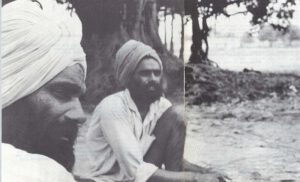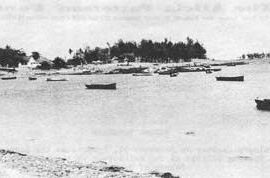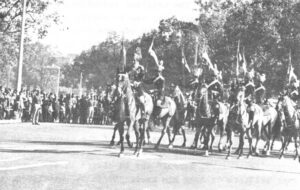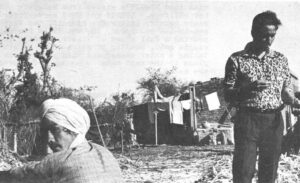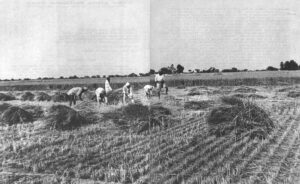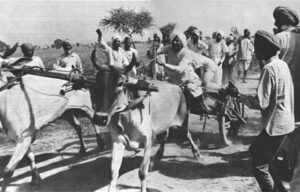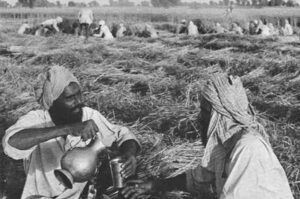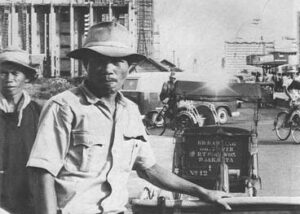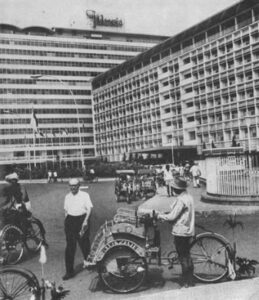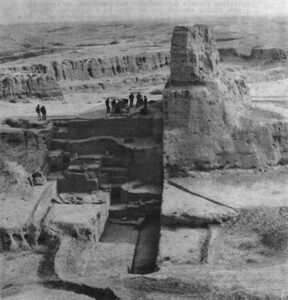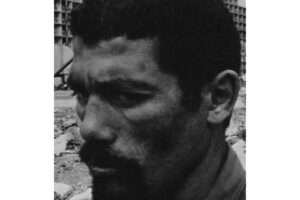A Study of the Human Impact of the New Seeds and Methods of Cultivation in Ghungrali-Rajputan, a Prosperous Village on the Punjab Plain in Northwest India
Part One: Charan
As a team of oxen are we driven
By the ploughman, our teacher
By the furrows made are thus writ
Our actions – on the earth, our paper.
The sweat of labor is as beads
Falling by the ploughman as seeds sown.
We reap according to our measure
Some for ourselves to keep, some to others give.
O Nanak, this is the way to truly live.
— From The Granth Sahib, the sacred scripture of tri Sikh religion
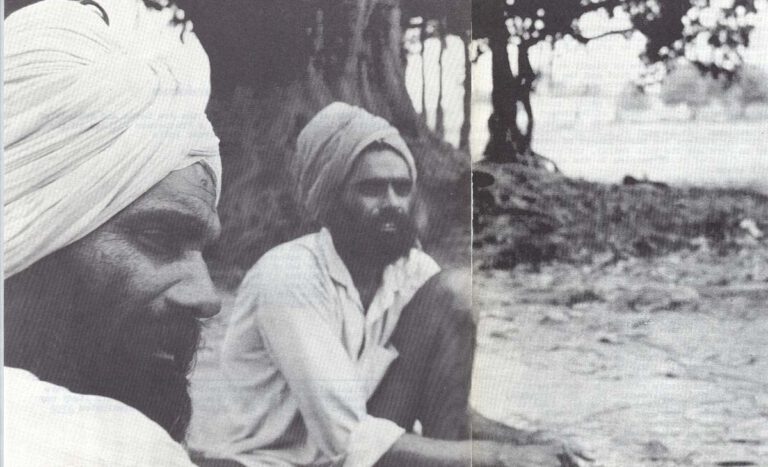
Contents
I CHARAN
Morning
Two Old Friends
The Mela
The Massacre
Charan
Honor
Il SEEDS OF CHANGE
Green Revolution
The Hunt
The Storm
III JATS AND HARIJANS
The Bullock Cart Race
The Boycott
IV THE HARVEST
Reaping
Threshing
Evening
Introductory note:
In an Article, “INTO THE 1970s” published in its December 27 1969 issue, the London Economist noted:
The 1970s have already been indelibly marked by the 1960s, but they will have their own successes, most probably in economic and technical advance, and their own lost opportunities, most likely the failures of liberal intelligences.
After a review of global security, the Economist considered at length five issues it felt were among the most important hopes and fears for the decade ahead. These included the likelihood of the rich countries attaining a 50 per cent increase in real income, the growth of giant international corporations, the race and generation gaps and the danger that political conditions and emotions might impede technological advance. The fifth issue, discussed in an article titled, “Green Revolution or Red?” was summarized:
In the poor two-thirds of the world there is likely to be a sharp increase both in the production of food and the number of unemployed farmers. In some of its overcrowded cities there may be mob-led revolution, as in France in 1789.
This is also the central theme of the following study, confined to a small group of farming villagers in the Punjab of Northwest India. The purpose of the study was not to seek answers but to further discover, define and describe the questions. It is part of a larger project exploring in a Mauritian fishing village the human impact of overpopulation and in villages in Java and the Nile Valley, the problems of mass unemployment and the flood of rural peoples to the cities, all aspects of the same overall theme.
This particular study, “Sketches of the Green Revolution,” which I have divided into four parts, is intended primarily to be read by economists, sociologists and agricultural technicians who are professionally involved in the agriculture revolution now taking place from Tunisia to the Philippines but who do not have the time to spend several months living in a village, as I did. Although I had no idea what I would find, my study mainly turns around a social confrontation and polarization, rooted in the economic change brought by the new seeds and methods of cultivation, between the Jats, or farmer-landowners of the village, and the Harijans or untouchables, who, whether they be Chamars, the traditional leatherworkers of the village, or Mazhbis, the sweepers, are being gradually forced into the role of either a rural proletariat or urban migrants.
Initially, I attempted to follow the familiar approach used Oscar Lewis in his “Five Families.” in which he presented Mexican case studies in the culture of poverty through portraying a village family on a typical day, drawing upon detailed observation, interviews and recorded dialogue. Very early in my stay in Ghungrali I shifted from the family in a single day approach and instead focused on a single farm operation over a period of six weeks, from the first of April 1970, to May 5, the day I left Ghungrali. I did keep to the Lewis method of recording dialogue or “selective eavesdropping” as it has been called. As a journalist who has always relied on interviews, I was amazed how much more valid natural conversation is. The Punjabis, as the one autobiographical monologue presented may suggest, tend to “go dead” in interviews, just as they stiffened up at first when I started taking photographs. All the conversation in “Sketches” is drawn verbatim from some 120,000 words taken down, mostly in the fields, from February through the first week of May. I have taken the liberty of using some of the material gathered in interviews as thoughts by the villagers.
The present study is not complete. I plan to spend the month of October in Ghungrali during the sowing season, hopefully gathering in some of the loose ends. A final word on methodology: As in the Mauritian fishing village, I found it necessary to actually work with the farmers in Ghungrali, helping them cut fodder, harvest and so forth, in order to gain enough empathy and rapport. I knew no Punjabi and except for a few cultivated villagers who spoke English, I relied mostly on an interpreter, Krishanjit Singh, a distinguished Punjabi writer and translator who not only did an excellent job of interpreting but was blessed with a writer’s sensitivity and a Punjabi’s sense of humor. Two exceptions were the leading two characters, Charan and Mukhtar, with whom, working together every day, I was eventually able to converse at length in a mixture of fractured Hindi and broken English. A word about names. All Sikh men have the surname of “Singh,” which means “lion” and all Sikh women have the surname of “Kaur,” or “young prince.” Use of the last name connotes respect and formality; I have kept or dropped the Singh from the names of the villagers depending on the usage of those to whom I was closest, which seemed the most natural. Also, since I have used a smattering of Punjabi words without footnotes, a short glossary will follow part four.
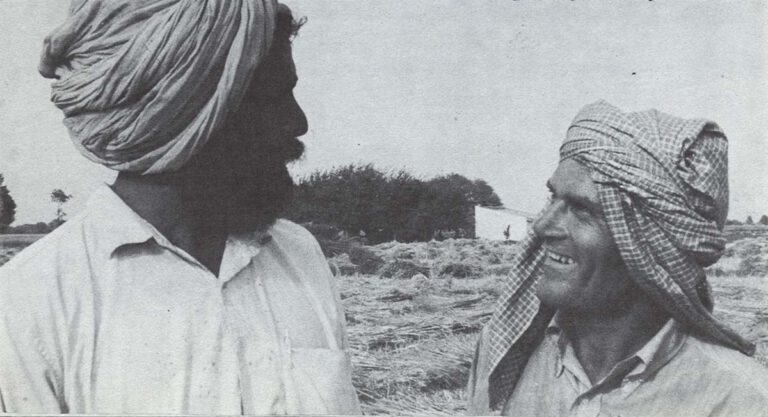
As will be self evident, I owe a great debt of gratitude to my interpreter, Krishanjit. I am also grateful to officials of the External Affairs Ministry and Food and Agriculture Ministry, Government oil India; Dr. M. S. Randhawa, Vice-Chancellor of Punjab Agricultural University and Dr. T. S. Sohal, professor of extension education for recommending Ghungrali and introducing me there; Wolf Ladijinsky of the World Bank and Chadbourne Gilpatric of the Rockefeller Foundation staffs in India. Finally, it is to Charan himself, who appears on the previous pages making rope and below with myself during threshing, that my deepest gratitude is owed. Not only for his hospitality but for encouraging me, as best an outsider could in a limited period of time, to make the study of Ghungrali as honestly true as I was able. It is at his request that I have used real names and made no attempt, to preserve anonymity. Photographs of Charan and the other principal characters, in the order of their appearance, follow on the next few pages.
Richard Critchfield
New Delhi-Singapore, May 27, 1970.
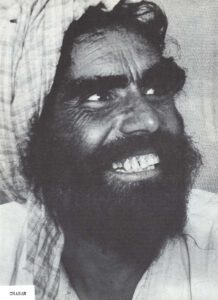
CHARAN
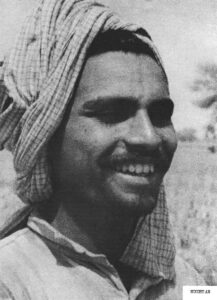
MUKHTAR
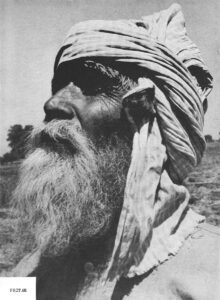
PRITAM
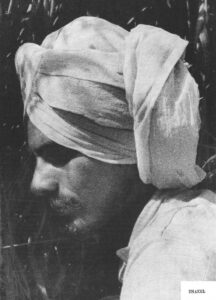
DHAKEL
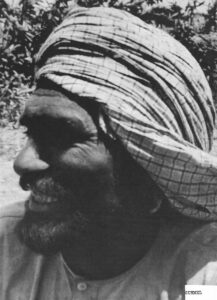
GURMEL
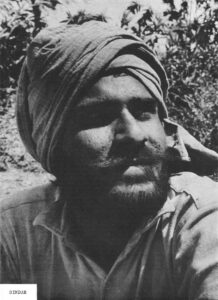
SINDAR
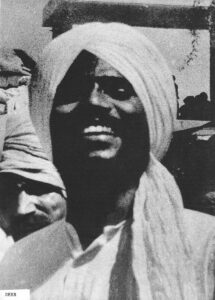
SHER
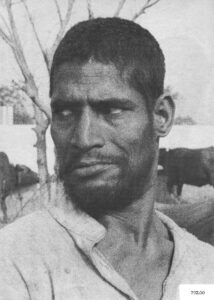
PELOO
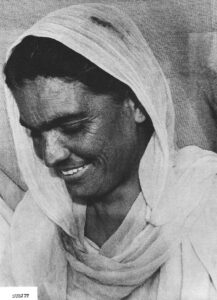
SURGIT
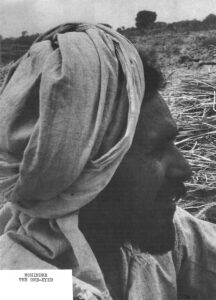
MOHINDER THE ONE-EYED
AND…THE MAZHBIS
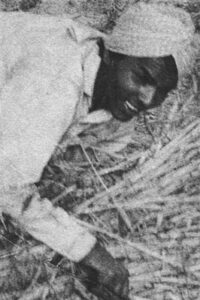
DARSHAN
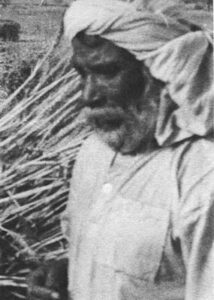
OLD CHANAN
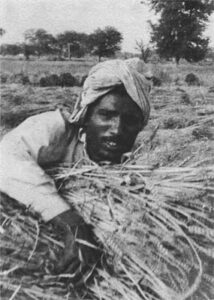
BAWA
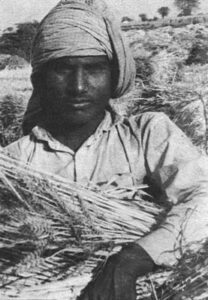
KAPUR
PART 1: CHARAN
Morning
Early one April morning a springless, bone-shaking bullock cart rumbles oat of Ghungrali-Rajputan, a prosperous Jat farming village just a few miles southwest of the Grand Trunk Road, that celebrated thoroughfare which stretches from the Khyber Pass across the Indus Valley to Delhi and on down to the Ganges and Calcutta; the villagers have only to go to the Road and see all the life of India flowing by and this is nowhere more true than where it crosses the vast, flat expanse of green and golden wheat lands that is known as the Punjab Plain.
The cart groans and utters a load creak at the slightest movement; a copper drinking vessel, hanging from a pole fixed to the cart’s side, chimes in, like a bell. By these sounds, apart from its pathetically worn wooden flanks, you might conclude as to the cart’s age and readiness to fall to pieces. In the cart sit two inhabitants of Ghungrali, Gurcharan Singh, a Jat farmer known as Charan to his friends, and his hired laborer, Mukhtar. As they move, Charan crouches on his haunches on the cart’s tongue, holding the reins and coaxing on the bullocks in that strange high-pitched falsetto language of praise and curses with which Punjabis address their cattle: “Tat-tat-tat-tat-tat-tat. Ta-hah, ta-hah!” Charan calls. “O, your good fates. Go quickly or I’ll pull out your testicles. Tat-tat-tat-tat-tat-tat, ta-ha-a-a-a-h!” The bullocks, grave and dignified, ignore him, keeping to the accustomed rats they have followed to the fields in the morning and back to the village at night these many years. This path is as much of their existence as the dusty, flat road in the countryside or the grassy, cool shade at Charan’s well where they munch on berries or sleep, rolling over on their sides, all day long.
Charan himself is in a sullen temper. That morning his father, the old patriarch, Sadhu Singh, showing nothing bat a towel-wrapped head and white beard above his down quilt, called to Charan from his bed, complaining that the buffaloes looked thin; the old man had grumpily fretted to his wife, “They don’t feed the cattle properly.” The Old Lady, busy churning milk, shouted to Charan’s second son, Kulwant; in the fierce-sounding screech in which she always spoke. “You! Go help Peloo feed the cattle!” The boy, sipping tea in a corner had replied in a defiant, bat low voice so his father would not hear, “I’m not used to it” and had stayed where he was.
Fed up at seeing the old man’s comfortable pot-bellied figure bundled warmly in its quilt, Charan for once lost his temper and told his father, “Then why don’t you get up and go feed them? You won’t lift your finger but you criticize as who do work all day. It’s very easy to find fault.”‘
The Old Lady, his mother, alarmed by this unusual outburst, had screeched to her husband, “He’s responsible for the wheat crop. Why should you talk aloud? Let him do whatever he likes. We’ll see when the wheat is harvested.”
“He acts as if I’m going to throw everything away,” Charan had stormed. “That anybody could take all I’ve built up all these years. I’m not doing that. And if you’re so worried about the cattle, go and attend to things yourself.” At that threat, Sadhu Singh, who had never done a day’s physical labor in all his sixty years, stayed silent and feigned sleep. Charan had strode out of the courtyard and down the village lane that led to the family’s cattle barn. There, hidden under a pile of freshly cut fodder, was a bottle of country liquor and Charan filled a glass to the brim and downed it in a single gulp. Peloo, the crippled, deaf and dumb stableman, who loved Charan as one of the few persons in the world who was kind to him, hobbled over to the pump to bring him water to wash the fiery staff down. Now, still angry over the exchange, Charan curses the bullocks, “Go quickly or I’ll rape your mother.”
Mukhtar, crouched on a pile of jute sacking-in the back of the cart, hears Charan and guesses why he is ill tempered. “Charan is a good man,” he thinks to himself, “but the old man and lady are always intervening. And they are mean, mean to the lowest.” Mukhtar is still half-dozing, even after a hot glass of tea and putting the bullocks into yoke. Charan has them well trained and only a command of “Tuk tuk, tuka. Get in place,” is enough; the bullocks understand and gravely step under the yoke themselves.
Mukhtar yawns. His wife awoke him at four o’clock so he could see a giant star with a long fiery tail like a comet’s which-had mysteriously appeared on the southern horizon three days before. It was said in the village to be an omen. The old men said such a star had only once before appeared and that was on the eve of the village massacre in 1947. Mukhtar himself was too young to remember. He was born just three days before thousands and thousands of Ghungrali’s former Moslem inhabitants had been slaughtered by the Sikhs and Banda soldiers.
“Charan, ji,” Mukhtar says, “I saw that star this morning.”
“I saw it too. I had a bad attack of asthma last night and had to wake up the doctor for an injection. They call it the star with a tail.”
“Some say it last appeared, in 1947.”
“Yes. They say that when such a star appears there will be a disaster in the village. But it has been there for some days now and nothing has happened.”
After that there is a silence. Mukhtar recalls how he lay in bed listening to the pre-dawn sounds. First, the chirp of the black sparrow who lived like a rat in holes in the fields. Then the women rising to churn milk, followed by the sound of the jupji or morning prayer from the Gurdwara’s loudspeaker.
There is One God.
He is the supreme truth.
He, The Creator….
Before time itself
There was truth.
When time began to run its course
He was the truth….
The prayer went on and on and Mukhtar lay in his cot, listening, to it. Finally, came the beginning of the final chorus, sang by the old people and children who always went to the Gurdwara in the morning:
Air, water and earth
Of these are we made….
At the end of the prayer, Mukhtar heard-footsteps in the lane outside his house; shrouded men wrapped in shawls and blankets, going to the fields to answer the call of nature. Mukhtar knew it was time to get up, hurry to Charan’s house for a cup of tea and then go and harness the bullocks.
Now as the cart passes the Gurdwara, Mukhtar looks up through the gate and sees the priest up on the hilltop raising prayer -flags over the holy place’s still shadowy white towers. Unconsciously, Mukhtar observes all the familiar houses on both sides of the lane, the usual huddle of brick and earth houses, some with high walls enclosing their cattle yards, vegetable gardens and verandas. Here is Bhoondi, the sweeper’s, whose four sons have already left for work in the fields; the house of Sarvan Singh, Charan’s uncle, with its green-painted baithak facing the lane; in its courtyard Dhakel, Sarvan’s son, and Sindar, a vagabond cousin who is the black sheep of the family, move around, putting their bullocks under the yoke; but the bullock cart Boon rumbles past them, leaving them and their sleeping occupants behind. And next, the square yellow schoolhouse, also built on a rise and almost hidden by the high brick wall around it, which also encloses the post office. Beyond the school stretches the spacious open ground around the village pond, now almost dried up. A faint pink tinge of heather has been brushed across the dusty earth. And beyond the pond is the village’s giant banyan tree. Some say it is more than a hundred and fifty years old.
Mukhtar wonders what tales the banyan tree could tell if it could speak. What elopements, swordfights, drunken quarrels, to say nothing of the massacre twenty-three years before. The banyan tree’s fantastic heavy branches extend thirty or forty feet in every direction; roots dangle from them, hanging straight downward like gray icicles. Under the banyan tree it is completely dark and the black shadows cast by its branches are just beginning to creep across the dusty earth and over the road.
The village comes to an end at the banyan tree and then begins the open country. Here the dirt road splits, one direction going toward the Grand Trunk Road to the east and the other, which the cart takes, toward the land allotments where Charan has his fields to the south. Beyond Charan’s new white-washed cattle yard and shed and the banyan tree and behind them farther down the road the small earthen hat where Mukhtar’s wife and baby still sleep, is only one more house, that of old Pritam Singh, a gentle, white-bearded giant of a man, who at seventy rivals only Charan as the strongest man in the village.
“Chota,” says Charan, who has called Mukhtar “Little One” ever since he was a child, “we will water, the south wheat field today from the canal. Take a hoe from the well shed and walks to the khal that brings the snow water from the Himalayas. If someone else is using, you will have to open ten or twelve bunds, if not, only one or two.”
“Han, ji.”
Meanwhile, the cart has moved out on the broad limitless plain, broken only here and there by clumps of trees around the wells and pump houses. One after another, almost identical in appearance, these small landholdings unfold before the eyes of the two men in the cart. The farms stretch on both sides of the dirt road as far as the horizon, flowing into a faint dusty white atmosphere. You can go on and on in the Punjab and never see where this horizon begins and where it ends. The scattered trees at the wells create the illusion of a distant jungle hang with mist but there is no jungle; the rich land is too valuable. Almost all of it is planted in wheat, mostly still green but a field here and there sowed early and already ripening into a golden hue. But what wheat! It is all short, stunted and dwarfed! A thick tangle of plump heads on short, stiff stems, growing in a carpet all the way to the horizon and beyond to cover the whole of the Punjab and Gangetic plains. To Muktar this wheat still seems a miracle after five years with its lush, almost artificial appearance and its many strange names: Khalyan Sona, PV 18, 227, RR21, Triple Dwarf. As the cart moves, Charan comments on each field, “This wheat is sick. It has a disease,” “Not enough fertilizer; he’s a poor farmer,” or “Now that’s a good crop. Yes, that’s right.”
The sun has already made its appearance, across the fields southeast of the village and slowly begins its day’s work. At first, a long way ahead of them on the dirt road, where the sky is divided from the earth near the misty white tree line, a broad yellow streak of light creeps across the fields; in a few moments that streak of light has come a little nearer the cart, crept to the right and acquired possession of the banyan tree’s upper branches behind them. Something warm touches the faces of Charan and Mukhtar, a streak of light rises steadily up in front, slips past the cart, rises to meet the other streak and suddenly all the wide plain casts aside the grayness of dawn, smiles and begins to sparkle with dew. Almost instantly the chill of the night is gone. The fields and fields of strange dwarfed wheat, pale green, dark green, here brushed with gold-at the grain head as the harvest nears, the green grass alongside the road, the wild roses in the ditches, the ripe silver oats, all a rusty brown-grey and half-dead from the April heat and dust the evening before, now bathed in. dew and caressed by the sun, revive, ready to flower again.
A flock of black crows, cawing and scolding, flies toward the village from their night’s roosting in the treetops of the fields and in the ancient oaks along the Grand Trunk Road, flapping their wings with eager cries. Sparrows twitter to each other in the grass; far away to the left somewhere a peacock wails, a strange sorrowful sound; the turtle doves begin to coo and a covey of partridges, startled by the cart, rise up, and with their soft “trrrr” fly away to the wheat fields and field mice, rats, mongeese and dusty green lizards rustle in the grass.
But hardly has the cart gone two furlongs more than the dew starts to evaporate, the air loses its freshness and the great Punjab plain begins to reassume its languishing April appearance. The grass droops and the sounds of life die away. The dying green of the sun-burnt wheat, the white distance with its tints as cool as water but really dry as dust and the perfect blue sky appear at this moment to threaten a day limitless and listless with heat.
“It will be hot today,” says Charan. The bullock cart creaks along and turns around a bend in the road. It is not far to Charan’s fields now. Mukhtar sees all the while the same thing: sky, wheat fields, the hazy dust of the distance in the bright sun. The sounds in the grass are gone, the peacock has flown away, there are no partridges to be seen. Tired of chirping, the sparrows hop toward shady places in the grass; they all resemble one another with their little brown heads and render the plain all the more uniform.
An Uncle’s Sparrow with a flowing movement of his wings soars in the air, then, shaking his wings, darts off like an arrow across the plain, and no one knows why he is flying off or what he seeks. In the distance, water is splashing from a tubewell, the outlet set high in the air so the farmer can see it from all his, fields; it resembles a small, artificial waterfall. The cart passes a very rich field of wheat. A black pot has been propped onto a stick in the midst of it, to scare off crows and keep away the evil eye of jealous neighbors. A chipmunk runs across the road; then once more Mukhtar settles down to reverie, watching the long expanses of wheat, the unvarying trees and pump houses. But now, thank God, a cart laden with dried cotton sticks is coming toward them. A man is lying on top of the load; he has been watering his fields all night. Sleepy and dozing in the sunlight, he just raises his head to look who is coming. Charan laughs, a surprisingly joyous, deep-throated laugh, and calls a greeting, the bullocks put out their heads toward the cotton sticks, the cart gives a piercing creak in salute.
“Sat Sri Akal, ji!” laughs Charan. “Ki hal chal hai? Are you hale and hearty?”
“Tik hai, maharaj, maaj hai,” comes a grinned reply. “Kush hun. I’m enjoying. I’m happy.”
“Pani lugya? Have you finished watering?”
“Yes, all night.” The man, whiskered and hard-faced with a curled, waxed moustache, is known in the village as the Bandit and has spent twenty years in prison. This has left him more worldly and easygoing than many of the villagers and he is popular, although he carries a flick knife in his pocket.
“Why is this sun so bright so early in the morning?” the Bandit asks, blinking his sleepy eyes.
“There is so much darkness inside you.” Charan laughs again, his eyes sparkling and his teeth flashing in the sun against his bushy black beard and prods the bullocks forward.
The Bandit smiles sleepily, moves his lips and lies down again. As they move on, Charan tells Mukhtar, “You know, he had no enmity with the man he killed. What happened was Gurbachan Singh was his friend. This Gurbachan had a dispute over land with another man. One day he and the Bandit got drunk and the third man was sleeping, in the Gurdwara. The Bandit hit the sleeping man with his sword and cut his hand off. The man awoke and raised his arm but blood was coming into his eyes and he couldn’t see properly. Gurbachan Singh then hit him with a sword seventy-two times. Gurbachan Singh was hanged. Now his land to the west of ours is held by his cousins. The Bandit went to jail for twenty years and last year got oat. They had been drinking that time for five days because Gurbachan had been blessed with his first son.” Charan shakes his head and praises the bullocks, “May you have many sons.”
And now, behind the fields of the stunted green wheat a single poplar tree is standing. Who put it there and why, no one knows. Mukhtar can hardly take his eye off its pale green color and cool shadow. Behind it is a bright yellow carpet of mustard and a field where the oats have been oat and gathered into sheaves. Elsewhere Mukhtar sees nothing but the green, green wheat. It will begin to ripen and tarn gold and then a dull, whitish brown in a week or two.
The cart passes two boys squatting side-by-side and rocking from foot to foot, swinging sickles and cutting fodder. Together they slash their sickles at the green barsim, grasping a handful at a time, advancing slowly, steadily, on and on until a dozen bales are cut, crouched low and nearly buried in the tall grass. The barsim swishes before them, as if tossed by a breeze. The sickles flash brightly and rhythmically; and both together make the same sound: grrch, grrch…. From the way the boys gather up the fodder after cutting, from their faces, by the glint on their sickles and their wet shirts, it is not difficult to see how oppressive the heat is going to be. A big Dalmatian with his tongue hanging out runs from the boys towards the cart, no doubt with the intention of teasing the bullocks. But he stops halfway and looks with indifference at Charan, and Mukhtar; it is too hot for such play.
One man, pausing in repairing an irrigation ditch, stands and holds his back with both hands, mops his brow as the cart passes and follows with his eyes its progress. He stands a long time looking at the cart without moving before he finally picks up his hoe and goes back to work again.
“Hat! Hat!” Charan coaxes the bullocks. Mukhtar now looks at the landscape with indifference. The prospect of the heat to come exhausts him, It seems they have been creaking and rattling a good long while although they have come less than a mile.
The look of geniality on Charan’s face too gradually wears off after they leave the Bandit, leaving only a sweat-beaded forehead and ferocious expression between the grimy yellow turban and the bushy black beard.
An old man, with a clean, faded blue cloth loosely wrapped around his head and holding in his hand a long staff – quite an Old Testament figure – rises from feeding sugar cane stalks into an iron crusher and, with a word to his laborers to keep the bullocks moving around in a circle to keep the crusher turning, and, folding his hands palms inward in the traditional Punjabi greeting, walks up to the cart. It is Pritam Singh, Charan’s neighbor and his father’s first cousin; he is known for his simple, hardworking life and humility. Above Pritam’s door in the village are inscribed the words, “O Nanak, I am drunk with the wine of God’s name day and night” and Charan has never heard him say a word in meanness or anger. A similar old Testament figure sits without moving on a bank watching Pritam and his workers crush cane; he looks unconcernedly at the passersby. It is Charan’s maternal uncle, Mamaji, whom Charan has already greeted early in the morning. Mamaji has come for a few days visit with Charan’s father and is an old friend of Pritam’s from the days both were neighbors in the family’s old village in Pakistan.
“Sat Sri Akal,” says Charan.
“Sat Sri Akal, ji,” loudly answers old Pritam.
“Sat Sri Akal,” repeats Mamaji standing now near the cane crusher.
“Are you hale and hearty, young man?” asks Charan.
The cart moves on and the old men remain behind, turning back to the cane crusher and their conversation. Charan’s fields are just through a grove of trees around Pritam’s well.
Mukhtar involuntarily looks into the white distance as the cart goes to the right, lurches into a rut and then creaks round a bend. Now Charan’s wheat is on both sides of the road. The cart turns off the road, goes a little distance over a bumpy canal ditch and then comes to a standstill in the shade of the oak trees. Mukhtar jumps off the cart and unhitches the bullocks, tying them in the shade. The two animals at once begin to gravely brose and munch on the grass. Three crows fly up to the oak branches above them and by their cawing express their agitation and annoyance at being driven from their grassy shade.
Old gray-bearded Chanan and Sher, the oldest son of Bhoondi, who cleans Charan’s barn, both of them cheerful Mazhbis, hired for a week to help with making gur, are already at the well. Chanan has lit a fire in an underground pit below a big iron pan and sits feeding cane husks into it. Sher waits for Charan to come and start the diesel engine, which will supply power to the iron-crashing machine, unlike old Pritam Singh’s old-fashioned method of using bollocks next door. Charan unlocks the white brick tool shed that gives his well its distinction – none of his neighbors has one yet – and utters an oath. Someone has emptied out a dram of residue from the crashed sugar, which he had planned to use for distilling some country liquor.
“It was your father, Sadhu Singh,” volunteers Sher to Charan. “He came last evening after you had gone and had as pour it oat. He said, ‘It does not behoove us. It is beneath our dignity.”
“It would have made thirty bottles.” Charan says with a shrug.
Mukhtar takes a hoe from the shed and starts across the fields. After a short distance, he stops and straddling an irrigation ditch in his bare feet, he bends over and carefully opens a small earthen band to let the flow of water through. Then he dredges the channel with care, deftly repairing the ditch as he moves to the canal like the natural farmer that he is. On his way back he stops at the well of Sarvan Singh, Charan’s uncle and closest neighbor, for a drink of water. The tubewell of Dhakel, Sarvan’s son who farms the land, is running and as he approaches it in the hot sunlight, Mukhtar hears a soft, very soothing murmur and feels something cool and refreshing on his face like another kind of air. From a deep hole in the earth runs a narrow stream of water through a steel pipe, installed there six years ago, as was Charan’s own tubewell. The stream of cold water, which runs into an irrigation ditch and alongside a field of oats, is as clear and mossy as a woodland brook; from the pipe the water playfully splashes to the ground, glistens in the sun and babbling gently, flows smoothly toward the fields. At the well itself, a little pool has been formed around which grows some green thick luxuriant grass.
Near the well Dhakel, his sharecropper Gurmel and Sindar, another of Charan’s cousins, are planting vegetable seeds.
“This small hoe is better than a big spade,” Dhakel is saying, “We must go to Bhambadi today and get more seeds.”
“We shall show them how our bollocks ran like railway engines,” says Sindar, who always has a comment for everything.
“There is just a little left,” says Gurmel. “I’ll finish it in just a few minutes. I’ve completed six rows.” The sharecropper starts singing as he works:
Oi, a scorpion bit me when I was picking
berries from a thorny bush.….
O, my fancy, it you come to see me in the
guise of a cousin and bring your bride, I shall
give her earrings but to you only a big round plate
full of sweet juicy milk….
“There are many people in the village,” observes Sindar in his rather high nasal voice, “those who won’t sway their limbs at the time of sowing vegetables and they’ll be buying by and by, throwing away a bucketful of wheat grains just for nothing. Look how lethargic they are.”
“Yes, they are Used to it.” says Mukhtar, joining the conversation. “In fact, they are really eating the wheat instead of vegetables.” Sindar laughs and the men talk on while they work in the rambling style of men conversing at labor, drifting from one topic to another and back again.
“These are really big seedlings. They are hard to grow. Aren’t you going to plant watermelons?”
“We should. Let’s do some in the next few days.”
“Yes, just sow some watermelon seeds and forget about it. You’ll have enough for your family.”
“You can bring some lady fingers and eat chilies with them.”
Sindar chuckled. “If you eat green chilies you won’t have enough stamina to satisfy a woman,” Sindar calls to Gurmel, who is slightly hard of hearing in one ear, “O, Deaf Man, this land dispute I have at Isaru. You see I want to take possession. They’re my uncles who farm it now. Four acres that are legally in my name. They’re real bastards.”
“Most of the people are, there in Isaru,” agrees Mukhtar, “They are really furious. They drink every day and abuse people who pass through the village. On which side is your land?”
“It’s just this side, by the brick kiln.”
“Yes, I know where that is. If you go to the kiln, it will be toward Gharala on the left side. If you go to village Gharala near the well of the sarpanch.”
“O, I know. We have not been that side for a long time. Not since the mela last August.”
Gurmel finishes planting a row and straightens up, both his hands holding his back. “O, have you heard?” he asks. “There went, a Jat to Majari to seduce this Harijan girl. He was chasing this girl. Before that he had been in that village and had abused the Harijans. He was just riding that girl when the Harijans came and caught him. They started cutting him with spears and swords. He’s in the hospital now. He’ll die, they say. Ruthlessly, they started killing him. He was forcibly raping this Harijan girl. He had some enmity with her brothers. But she was not their real sister. Perhaps a cousin.”
Gurmel watches Sindar for a response but Sindar instead tells him to keep more distance between the seeds. Gurmel changes the subject. “Shall we ask four or five people with rifles if you really want to take possession of your land?”
“I have enough men with rifles.”
“The men I’m talking about have a passport for shooting people. They’ll set them right.”
“Will you come with me, O Deaf Man?”
“Will you give a pension for my children?”
“You’d be useless anyway. Sitting by the well, drinking wine and getting drunk.”
Sindar wants to water the seeds but Dhakel, Gurmel and Mukhtar disagree. Then Gurmel says he will bring two pitchers of water, “That will be enough for them.”
“Yes. We don’t need much water,” agrees Sindar. “Just bring a bucket and a pitcher fall. That will be enough.”
“The best vegetable is small pumpkins.”
“If we throw the hay somewhere else we could plant watermelons where that haystack is.”
Gurmel brings some water but Dhakel is impatient to start some other work. He calls, “Hurry up, hurry up, are you killing flies?”
“I’m doing my best. Now I’ll make distances between them because these plants will grow all sizes.”
“I’ve heard Amar is the same,” Sindar says to Dhakel, referring to a cousin whose mind went blank after drinking country liquor all one day. “He doesn’t speak and talk. Always keeps lying in bed.”
“Have they brought him home?” Dhakel asks.
“Yes, he’s lying there deaf and dumb, looking always in the air. He has become useless. After completing this job we should start cutting sugar cane. There is enough moisture in the fields. We don’t need to water for another eight or ten days.”
Dhakel sighs. “Our labors are yet to come, cutting the sugar cane.” “Now the wheat is all right. We don’t have to bother about it. We should look to the sugar cane. It will be too late otherwise.”
Dhakel notices the seedlings are withering in the sun. “They’re going to die.”
“They’ll die once and then they’ll come up again,” Sindar reassures him.
Gurmel returns and Dhakel tells him, “One pitcher will be enough for one row.”
“Once they start growing up then you, should spray some cow dung on them. Then you’ll see those plants shoot up like pistols,” advises Sindar.
Gurmel finishes watering and turns to the sky. “Now you food giver,” he tells God, “you stay sunny and clear.”
“Now the bastard will pour more rains when we don’t need them.” says Sindar. “There shouldn’t be rains in March. We don’t need at all.”
Gurmel laughs. “This month farmers are afraid of Old Grandfather up there. They say, ‘Grandfather, just be nice to us.'”
Dhakel gestures toward the hoes. “Now, pick up these weapons. Let’s move.”
As they walk to the well, Sindar observes, “We must pick that banana tree because it is squeezing the roots of the mango beside it. O, Dhakel, there is a lot of that new foxtail weed in the wheat.”
“I know. It never happened before.”
At the well, Sarvan Singh is waiting. He has brought tea. Like Dhakel he is a man of strikingly handsome features, but a humble and mild disposition. Some of the villagers say it is because he has been eating opium for almost forty years.
He tells them he has passed a field of wheat, which has fallen in the wind. “Yes.” Sindar replies, “Nobody can help it.
“Now start cutting the sugar cane,” Sarvan goes on. “It also has been affected by the winds these days. And look how those oats have been twisted around and bent over. This was Gurmel’s share and he wanted to make it strong and put too much fertilizer on it.” Gurmel answers, “Mine has already had one more cutting than yours.”
“They say at the university put five quintals of fertilizer per acre,” says Sindar. “But we should give two and a half. Our land is very rich. Otherwise the crop will go off its feet and fall over. Where the land is poor, fertilizer works the best.”
“O, one thing happened today.” Gurmel tells old Sarvan. When I got up a snake fell from the roof. Maybe it was trying to catch sparrows.”
“Once when a snake came here.” says Sindar, “he was hypnotized by the sound of the engine and stood erect. Sometimes watering at nights we really come across so many snakes but they don’t harm as. Once I was sleeping on a charpoy under that tree. When I got up I saw a snake slipping under my bed. I thought, ‘O, my sister’s husband. I would have been eaten by that. But I’m saved.'”
“Gurmel, how long was that snake that fell from your ceiling?” asks Mukhtar.
“An arm’s length. Black.”
“When we were picking up that hay,” Sindar says, “there was a snake about three arms long.”
“There lives a snake there, near that kikar tree,” says Dhakel.
“Let’s kill him.” But as usual Sindar keeps sitting. The men sip their tea and Sarvan offers a glass to Mukhtar.
“Are you going to the Jarg Mela?” Mukhtar asks. “Charan is taking the tractor.”
“No,” answers Dhakel. “We have to cut our sugar cane. Otherwise we must go.”
“I have not seen many melas except once in Khanna,” Sindar says. “In fact, there is no good mela except Hola Mahalla in Anandpur Sahib. The rest of the melas are the cause of fights. People get drunk and start abasing each other. If some fool makes the mistake of abasing someone like me he would find his head apart from his body the next moment. What are these melas? What does a mela mean if you don’t beat someone to death? Some owls never stop abusing some unknown man. And they get a good beating. A few men tolerate abuses. But those like me can’t stand this sort of nonsense. My way is first never go to any mela. If at all you do go carry a kirpan with you. But I like bullock cart races better. Whenever I hear of one arranged I am the first person to reach there. But these dirty melas are generally for these Mazhbis and Chamars.”
“Yes, that last dose of fertilizer made this mess,” sighs old Sarvan, who has not been listening to his nephew’s aimless talking. “You must spray when you, sow wheat. But afterward in applying extra doses you must be very careful. Otherwise this new wheat goes app immediately up, and lodges in the first bad wind.”
“Yes,” agrees Sindar. “We made a mistake. Next time we’ll put on only desi manure after the first time. If we follow these university wallahs, due to overdoses of fertilizer, there won’t be any wheat at all. We don’t follow their rules.”
Two old men wearing spectacles and carrying cloth sacks approach.
Dhakel says, “They’re Harijans. They want to weed our wheat fields to get fodder for their buffaloes.”
Sindar says, “Let them. But they should be careful. They should not break the wheat stalks.”
The two old men greet Sarvan and there is an exchange of “Sat Sri Akal’s.” One of them tells Sarvan, “Your garlic will take another month or two to ripen.”
“Yes.”
As the Harijans move on, Dhakel and Sindar go with Sarvan to see how much wheat has lodged and Mukhtar follows Gurmel who goes to cat oats for fodder. When they are out of earshot of the three Jats, Gurmel asks, “Well, how does it go with Charan? Two sharecroppers have already run away from him this year. Of course, you, Mukhtar, you are a daily laborer and can quit when you like. You are not chained to these Jats on a year’s contract like I am.”
“Charan himself is very nice,” Mukhtar says, “but it’s the mother and father who are really mean. I needed two rupees this morning and they wouldn’t give although they had it and they owe me forty. I told Charan and he got it for me.”
“They’re so mean,” Gurmel nods, cutting the oats as they crouch and talk, half-buried in the oat field. “Everyone in the village knows it.”
“The mother is the meanest. She’s mean to the lowest. There was a person, a Mazhbi, who wanted to buy an old fodder-cutting machine from Charan. Charan told him one day, ‘Are you looking for a fodder cutter? Look, I have one there, lying there rusting.’ The man saw it and decided to bay. They reached a bargain. The man would pay forty rupees. When this person came back to take the machine, Charan had gone away and the mother and father were in the barnyard and accused him of theft. And the Mazhbi was very angry and insulted. The old lady said, ‘You have come to loot our barn like a bandit.’ They should have asked their son before insulting someone like that.
“Yes,” Gurmel agrees. “If it had been a Jat they might-have had real trouble. I am fed up with working for these Jats. These days we Harijans are more inclined to take odd jobs instead of being sharecroppers for these Jats. In my case, I have a goat I bought for one-hundred-fifty rupees. If Guru is in my favor, this goat will give me two lambs worth a hundred rupees each. I have a cow, a buffalo, also which will give me calves in two or three months. Last year I bought this buffalo for a thousand rupees and now I sell milk worth ten rupees every day. The government is a big addition to my assets and now they have opened a new dairy and milk collecting station at the Bija bridge. Why should I be a sharecropper and get my skin eaten up by these Jats when I can earn more than I am earning here? I shall be having milk all over my house soon. And you know from seeing my house that it is as good as Charan’s.”
“Before you came, Mukhtar, they were talking about my meals, that I eat too much. What do they give me? Just two chapattis a day. This is part of the contract. They must give me hazri. Next year of my seven brothers only one will be a sharecropper. But I won’t be if Guru grants me healthy limbs.”
“The Jats may be strong, but they can’t work as hard as we Harijans,” says Mukhtar.
“Aye. Take Basant Singh. He used to treat Harijans like animals. Give them the worst food to eat and try to take the most work out of their skins. Harijans stopped going to him, even as daily wageworkers. Now he has taken a right line. He has had a lesson that if he treats Harijans like animals they will also start treating him like an untouchable. It was a sort of undeclared boycott.”
“When did Sindar come back? He has not been around here for some weeks.”
“He?” Gurmel cursed scornfully. “Now he is telling people he is Dhakel’s brother, that vagabond. He is only a cousin,” Gurmel looks over the oats and sees Dhakel and Sindar have moved far away across the fields. His voice becomes confidential. “Now I shall tell you the real story. The truth is that Sindar is a bastard. His mother was married to a man in Isaru village. She left him and went to another person near Kharar. He was an old man and used to do bad works. He was smuggling opium. Sindar was born in Isaru and one brother and sister from that bad man. Both fathers are now dead. His mother lives near Kharar and has land. It is about sixteen acres oat of which she has put six in Sindar’s name bat she will never let the bastard touch her property now. Legally, it’s his right.
“In this village of Isaru he also has four acres of land, about which he was talking this morning. His uncles and cousins are plowing there. So now he takes opium. It is not known to everybody. Only I know. Now he’s here for some days. He’ll run away when the harvesting starts. He knows they won’t give him food unless he works on their land.”
“What was that story you were telling about the Harijan girl being raped in Majari?”
“Ah, that. There is a man in village Kishangahr; he has some property in Majari. About six acres of land. In his mother’s name. And the Harijans involved, they are seven brothers, Chamars like us. One of them is a murderer. He was in jail for many years. But now he is out. His main job was to murder for money. He is the girl’s brother. He charges four thousand rupees for a killing. One day he was not at home. And this Jat from Kishangahr came. He has a grudge against Harijans because they were once tenants of his land and they tried to claim possession. This Jat went to the house of the seven brothers. It was Lohri, the 13th of January and the Harijans were burning fires to celebrate. So this Jat came and abased every one of the family members and went home safely. Four days ago he went back again and crashed his tractor against the door of the Harijans house. He was real drunk. He was immediately caught by all seven brothers and beaten with lathis, spears and gandasas. Now he’s in the hospital. I said he was raping the sister. That part is not true. The Harijans of Majari made up that story to excuse their beating of him. So the Jats will not know it was a land issue and unite against them. So we are spreading the story around all the villages. The dispute was over land only. But the Jats must not know this. They mast think the seven brothers were avenging their sister’s honor. He may die in the hospital. His head and arms are cut. He had a grudge against them because they used to plough his land and he repossessed with difficulty. They had been working the land more than three years and under the new law had legal claim to it. But tell everyone the story about the sister, Brother.”
Gurmel’s voice drops to a whisper as he sees Charan approaching across the oat field. Charan stops at a haystack and calls Mukhtar to come and help him. Charan tears off the top crust of the hay because it is encrusted with dirt. He pitches the hay onto jute sacking the two Harijans spread out on the ground and Gurmel and Mukhtar each takes a bundle on his head back to Charan’s well.
“Dhakel Singh should not have started cutting those oats until the plant is fall and gets some grain on it,” Gurmel observes.
“Yes, with grains it is good for milk cattle,” Mukhtar agrees. “Why are they in such haste?”
“They always know better themselves, these Jats.”
Charan, overhearing, comes up impatiently behind them carrying his fork, “Come, come, give me way to pass.” Mukhtar moves aside, balancing the huge bale on his head. Gurmel and He leave the bales on Charan’s bullock cart and stop at the pump for a drink of water. Gurmel looks across at Pritam Singh’s well where Pritam and his workers are making gur.
Mukhtar: “Pritam Singh used to draw four and a half maunds of water from a well eighty foot deep. (one maund=82 pounds) Everyone knew that Pritam was very strong. But once some men in the village played a trick on him. While he was coming from the fields, they tied a big rock weighing about thirty kilos to the bottom of a water bucket and lowered it into the well. When Pritam came by they asked him to see if he could help them and draw the bucket up. He drew about five and a half maunds of water and rock from a soft deep well with ease and asked them, ‘Brothers, is there any more help I can give you?’ He never knew it was a joke and since then nobody ever dared try another trick on him. Instead they respect him and he goes his way and does his work and doesn’t bother anyone. He is very modest and will never say he is the strongest man in the village. Maybe, perhaps, after Charan.”
Charan, hearing his name, calls to the two laborers; “There is a new record in our village. Two sons with one father and two different mothers. They came to the field yesterday. One with bullocks and plough, and the other with seeds. One ploughed all day and the other sprinkled seeds in the furrows. They sowed half an acre of land and came back to the village. Then they brought back a plank to smooth the earth. But they never spoke a word to each other all day.”
“I know them,” Mukhtar calls to him. “It’s their manner. Some people are like this.”
Gurmel returns to his oats and Mukhtar takes up the hoe and turns toward the irrigation canal again. He looks at the landscape, seeing exactly the same as that which he had seen earlier in the morning in the bullock cart and on his walk through the fields: the ripening bat still green wheat, the trees and pump houses, the sky, the white dusty distance. He looks back at the village and can see only three or four houses in the mist. There is no life to be seen near the walls or roofs from this distance, nor water, nor shade, just as if Ghungrali had been overcome by the burning rays and dried away. Mukhtar turns to his work; the wheat must have water.
Two Old Friends
“Putchkar, putchkar. O, may you die!” the boy aimlessly called to the bullocks, swatting their flanks with his stick as he followed them round and round the cane crusher. “Ham bol de. You remember God.”
Then, for a time, no sound of voices; one heard the bullocks, one white and one tawny, munching and snaffling; somewhere quite far away came the plaintive cry of a peacock, the mated song of the cuckoo and the persistent irritable cawing of crows and the high, twitter of the sparrows. But all these sounds and the boy’s occasional cry to the bullocks did not break the silence, they did not stir the stagnant air, rather they lulled it to sleep.
Gurdev, the sharecropper, oppressed by the heat and the silence, paused in feeding husks to the fire below the gur pan and called to the boy, “You’ll have rice with milk and sugar today.”
“O, no, I’m not that lucky.”
“If you put black peppers in it, it’s good.”
But the boy has started singing, tapping the bullocks’ flanks to the beat.
Come and dance, Nasid Kaur, come and dance.
“Hey, Scooter!” Gurdev called to a Mazhibi cutting fodder in the next field. “We had a bet yesterday for two bottles of liquor. Our sardar’s son and one Chand Singh. They told as they had seven bales of oats to cat on the machine. They gave as a ten paisa coin to fetch some hot cakes from village Chazipur. ‘If we finish cutting these seven bales and load them onto the bullock cart before you return,’ they said, ‘you will have to give as two bottles. But if you return before we finish cutting, we’ll be giving you.’ When we returned they hadn’t even cut half the oats on the machine yet. What to talk about loading them on the cart!”
“We will get the bottles out of them,” the boy said, “Now they’re making excuses. When it went into the machine, they say, sometimes the oats got stuck. Haphal gaya.”
Gurdev laughed. “When they saw me coming back there was muck panic and confusion among those two.”
Surjit, a tall, stout Jat and the youngest son of old Pritam Singh, listened to Gurdev as he approached carrying a load of sugarcane to the crusher. “It was the machine’s fault,” he called to Scooter. “Now we have decided to give them one bottle instead of two.”
The boy was singing again.
Come and dance, Nasid Kaur, come and dance.
Gurdev grinned. “The decision was one bottle which they promised to give as today. So it’s decided to give as one bottle, is it?”
“We’ll give you in the evening.”
“See our bravery,” Gurdev said laughing. “We agree to one bottle instead of two. We are Harijan sharecroppers and they are Jat landlords.”
“They’re afraid they may lose that one also.” Surjit said. “They think that we, husbands of their sisters, won’t give them that bottle also. Then there will be a quarrel between them, because Boy was one field behind Gurdev.”
“No, we came together. He’s lying,” called the boy from behind the bullocks.
“Why don’t you pick a quarrel with the Boy, Gurdev?” Surjit asked. “Don’t talk to me. Iron it out between yourselves.”
“Look I’m an old man and he’s a young boy,” grinned Gurdev.
“You were running like a jackal last night.”
The boy sang:
O, sealed bottle of Nabha town
If we see you we get drunk at the sight of you
O, sealed bottle of Nabha
We’ll break your cork at four in the afternoon.
“Maybe you had bicycles hidden in the fields and went by cycle,” said Surjit.
“No, no, we went jumping through the fields,” Gurdev answered him. “Then we bought ten paisa cakes from the shopkeeper. If we couldn’t have got the cakes, we would have brought gold sugar candy. We ran straight to that white house. People were calling on the way, ‘Why are you running?’ I shouted back, ‘Brothers, we have a bet.'”
The boy said, “To some we called, ‘There is a hare running before us and we are going to kill him.”
“You were covered all over with sweat from cutting the oats and we were wet all over from running.”
“We had a lot of fun,” said the boy.
“Come in the evening,” said Surjit. “We’ll give you. Was it a mile from here?”
“It was about twenty-five acres.” Just then a Shikara hawk flew overhead, stopped, changed direction in mid-air and flew off in pursuit of sparrows.
Come and dance, Nasib Kaur, come and dance.
The boy stopped singing, “Uncle, today we’ll go to the circus. I saw a searchlight from Khanna last night. O, Scooter is coming to join as.”
Scooter, a short-statured but stout Mazhbi with a black beard evenly fringed white beneath the chin, sat down on the canal bank near Gurdev at the fire and lit a cigarette, his sickle dangling over one shoulder.
“Are you hale and hearty, Scooter?” laughed Gurdev. “Sit down. So what do you think of our bet, yesterday?”
“Be careful.” warned Surjit, who was stirring the boiling gar. “You’ll lose the second bottle also.”
“Something must have stuck inside the machine,” grinned Scooter. “Otherwise you couldn’t have beaten these Jats.”
“We brought seven bales and we sharpened the cutter for them and we spread jute sacks on the ground.” said Gurdev. “They started running the motor and we started running. They called ‘Wahgru!’ and started pushing oats into the cutter and we shouted ‘Wahgru!’ and started running to Ghazipur.”
“Chand was just blind.” laughed the boy. “Re was running every which way, like a blind man.”
Surjit growled, “This black boy was two acres behind Gurdev when they got back and ultimately we decided to pay just one bottle.”
“When we came to yoke the bullocks we couldn’t walk.” said the boy, “Our legs were stuck. Chand started abasing as, ‘For what do you want the two bottles?'”
“We tried to find the person who sells liquor but we couldn’t find him,” said Surjit. “Now if they keep on talking about it, they’ll lose the second bottle.”
“Yes, they have no right to make such a fuss,” laughed Scooter. “Let them lose the second bottle.”
Gurdev said, “Today we’ll ran to Karnail Singh’s house in Ghazipur and break a twig and bring it.”
Scooter laughed, “If you like we’ll bring his wife also.”
Surjit said, “Get ready, Scooter. Do you think you can run so far?”
Scooter sighed. “We’ll run the day after tomorrow. I’m not, greedy for drink like Gurdev.”
“Here, have some sugar juice,” offered Surjit.
Scooter went to the crasher and dipped his finger into the bucket of raas or sugar juice. “O, I can’t relish this today.”‘
“It’s because you’re weak.”
“Now you have grown old,” said the boy. “Your hair is turning gray. I used to drink one kilo myself.”
“I’ll drink five kilos if you like,” said Scooter.
Gurdev laughed. “If you drink five kilos you will be sitting all day in the field with your shorts down.”
“The searchlight last night came from a circus,” said the boy.
“Elephants, camels, ladies,” sighed Gurdev. “And me with no money and no bottle.”
Just then Pritam Singh approached, through the fields, carrying a brass container of hot tea. The men paused in their work and gathered in a semi-circle, squatting as Pritam poured tea into their upraised glasses.
The old man, who still at seventy worked in the fields all day, had a gentle, saintly expression of face. Pritam would never see the Sistine Chapel, indeed, he had never heard of Michelangelo or was even aware of his own physical beauty; he would have been humbled and amazed to learn that the greatest artist of the Western world had once fashioned his image of God in a face and physique very close to Pritam’s own.
After tea, the men return to work and Pritam goes to the crusher and sitting on the ground, feeds the cane into the rotating iron cylinders. The bullocks are attached to the crusher by a log and each time they make a round Pritam must duck his head because of his great size. But he is used to it and seems to do it almost unconsciously.
Gurdev called to the boy, “You work seriously now, Boy, like a man.”
“If you don’t think me a man.” the boy called back, “what are you, a pair of trousers?” The boy turned to Pritam. “He called me a chicken earlier so there’s no harm if I call him a pair of trousers. O, bullocks move forward. May you live long. The crusher makes noises.
Pritam answered, “Yes, a little.”
“Don’t worry. We’ll fix it tonight if we can.”
“What about your bottles?” Pritam asked.
“We’ll have tonight.”
“I heard you had last night.”
“We didn’t find the man who sells the bottles.”
“I know everything,” Pritam teased the boy. “You had last night. Don’t try to fool me.”
“Have you finished?” the boy asked Pritam, meaning had the sugar cane all been cut.
“Why should we be finished,” Pritam smiled. “The finished are those who don’t come back to this earth. We are the living.”
“Some will go on working until they die,” said Surjit. “Those who can afford it they stop working at sixty; those who can’t go on working until they drop dead in the fields. But a person who sits on a charpoy all day must sell his lands or he can’t eat. While a man who works remains healthy.”
“It’s true,” agrees the old man. “Work can keep your health. An idle man gets lead in his bones.”
Another old men, very much an Old Testament figure like Pritam himself, approached their well along the road. Pritam recognized Mamaji, Charan’s uncle, an old friend whom he had not seen in many months. “Sat Sri Akal!” he called out, chuckling.
“Sat Sri Akal, maharaji,” Mamaji called back. “Kya hal chal hai? Are you well?” The two old friends shook hands and Mamaji oat down on the canal bank with a sigh while Pritam went back to his place at the crusher.
“There in Hissar district where I live now we sometimes sow desi wheat.” Mamaji said. He had to raise his voice as the two of them were quite far apart and the crusher groaned and the bullocks’ yoke creaked as the animals went round and round.
“Because we can rely on rain,” Mamaji went on. “We have twelve acres without irrigation.”‘
“What about sugar cane?” Pritam asked.
“I have a good deal of that. I don’t have an engine but I have a camel. When we came and took possession of the Moslem lands, let’s see, can it be twenty-three years already? – we had twelve acres of good, lash sugar cane and there we didn’t use to grow cotton. Sugar cane was the main thing in Bahalpur district.”
“If it’s a wet day, we just can work the crasher. This raas gets soar. Yesterday it was like deep winter here.”
“It’s like winter of course, but in Ludhiana there’s so many mosquitoes already.” Mamaji complained.
“There was a procession in Ludhiana yesterday I heard.”
“I didn’t see it. I came at noon. I stayed with a cousin of mine. He’s an overseer and lives in Modeltown.”
“I heard there were a lot of tractors of our Sikhs in the procession because the government may impose income taxes on farmers.”
“In Bikaner, we had a flat income tax of five hundred rupees on twenty-five acres each year.”
“There is also some tax in Kadhur, I’ve heard.”
“It’s not that direct tax. It’s a hearth tax. Some of those tax collectors eat it up themselves; they just make fools of as.”
“Indira Gandhi will drown the boats of the Jats if she imposes income taxes,” said Pritam. “They have already imposed in Rajasthan.”
“Did I feel a rain drop?”
“It’s only that one small cloud overhead. It will go away.”
“We are not salt that will melt away,” said Pritam.
“Those tax collectors will go on scratching round your houses,” said Gurdev while stoking the fire.
“Your raas bucket is full,” observed Mamaji.
“Yes,” said Pritam. “Let the boy take a round with the bullocks first. We’ll stop at this side.”
“All the gram fields have vanished since the last time I was in Ghungrali,” Mamaji said. “In our area, there’s really a big crop of grams.”
“If they’re there, they’ll come here also. Previously people used to plant them in cornfields. I had two or three acres over there. We sowed grams. They were about twenty-five maunds. Boy, bring some more canes, would you?”
“We used to feed grams to the cattle. Sometimes they didn’t eat anything else. I see Charan is making gur today also. He has that diesel engine.”
“Yes, they’re over there.”
“These days bullocks bring very high prices in Hissar.”
“This side of the country they’re cheap,” answered Pritam. “It they’re not really good bullocks, they don’t fetch good money.”
“Like my own fine white bullocks can fetch two thousand rupees. Ours are three years old.”
“These you see are four years old,” said Pritam.
“My brother just brought-one for two thousand and sixty rupees.”
“Ah.”
“The camel is best for crushing sugar cane,” Mamaji said. “O, Boy, you have broken that rope.”
“You should have tied it nicely,” scolded Pritam. “You just do half things. Now it is all right.” Silence returned from some moments with only the sound of sparrows chirping. “These days camels are cheaper.”
“Camels in Bikaner are very dear.”
“Yes that side they are. Here, there are no Persian wheels any more.”
“Yes,” Mamaji agreed, “now camels are not sold here in Ludhiana district. In the old days we had beautiful saddles for oar camels. These days if a man comes riding by on a camel, people don’t like it. They expect everybody to have a tractor or a motorcycle. We had a saddle one time that cost as eight scores of rupees. We made the floor end rug in our own house.”
“We bought a saddle from Maghiana one time. Even if you put it under a bullock cart it wouldn’t even jerk. It was so nice. If you are once on a camel with a proper saddle it looks like you’re riding a horse. “
“Heh-heh-heh-eh.” Mamaji laughed, ending in a coughing fit.
“There are few persons around here who have not yet started crashing their sugar cane,” Pritam said.
“Sadhu’s daughter, Surjit, has only started. They bought a new gar pan from khanna. And one of the old ones they mended. Charan took them the crasher from here. Let’s see, today is the third.”
“Charan went on the 27th. It was then that we sent the crusher.”
“Yes, I know. The days pass so quickly now.” For some time neither spoke and the silence around the two old friends was like a tomb, as though the air were dead too. The old men sat silent, thinking.
“When we used to make white sugar there was a great hue and cry that there would be taxes on the land and this and that,” Pritam reminisced.
“Yes. White sugar is more expensive and you really can’t compare it with brown sugar. Nothing is better then gur.”
“Is Charan bringing in hay today?””
“Yes, he is just carrying two bales in the cart. He has no place to put it at the barn.”
“He should make a storeroom.”
“They must have spent three to four thousand rupees on that barn. My guess is about one thousand rupees on labor and the rest on material and lumber.”
“You know Sadhu mortgaged three acres in Bija to pay for it.”
“He mortgaged three acres in the old days in Lyallpur also.”
“Yes, do you remember how he would go here and there, gossiping and doing nothing. There were so many like him in those days. We used to call them the safe posh, those in white clothes. They used to bay hay from as and seeing as, they too began to work hard with their hands. Some of them made fortunes. Ah, if a man without enough land wears white clothes he will do badly. We also want to wear white clothes, but we can’t afford it.”
“But Sadhu is a clever man. Look how he brings all these machines from the university to do his work.”
“Yes, times have changed. Now cleverness is almost as important on a farm as hard work. But it is Charan who saves that family. He would be a very good man if he didn’t drink so much.”
There was a sound of barking. “O,” Mamaji called, “look! That dog will attack Sarvan.”
“No, no, he hasn’t attacked him. He is chasing that bitch.”
“Ah, yes, it was a bitch he was after.”
“In Nagor,” said Mamaji, “this time of year was always cheap for bullocks.”
“If Nagor was cheap, why was labor always so expensive?” Pritam asked.
But Mamaji was lost in his own memories. “Yes, it was every month a cattle fair in Nagor. But the biggest is in Hissar these days.”
“There was one person who used to go to Hissar.”
“Who, who used to go to Hissar?” Mamaji asked. Pritam stopped to empty the bucket of raas. “Put it here,” he told the boy.
“There were some foreigners in Hissar,” Mamaji said. “They won’t take as to America. Why should they take us? A person took seven thousand rupees from me one time promising to take me to America and he was really a thug. It was all a swindle. Because he never took me. We told other men not to believe him but the foolish didn’t believe us.”‘
“I’ve heard it costs three thousand rupees on fare,” Pritam said.
“Another man sold his lands to go to America. He sold one piece for seven thousand and told his father-in-law, ‘You take care of the fields and I’m going to America.’ But who was go and who was to take him? The poor fellow remained there, losing his land.”
“It is enough only if we fill our bellies day and night. There’s no money in farming.” Pritam sighed. “There came an Englishman in a car one day. His tire was punctured on the Grand Trunk Road. I was coming on a bicycle. It was sunset. I was also very much tired. There were two of them. One was his wife and the other this Englishman. He started mending his car so I also stopped to watch them. There was a big crowd of young men bothering them. He took oat a revolver and told them to ran away.” Pritam chuckled. “They never looked back, those brave young men. They had been looking at his wife. I remained sitting on my bicycle. He said, ‘We’ll put your cycle in the car and you come with as to Khanna.’ So he gave me a lift. I sat comfortably in that car. The Englishman had traveled a lot and could tell a bad man from a good man. Shabash, my son that is good you have brought more canes. The raas we used to take in Lyallpur in the summer months you can’t compare this raas to it. It is very warm today. “
“It will rain, don’t worry. What to say of warm.”
“Have you prepared cane for crushing, Mamaji?”
“No.”
“That’s good. There surely will be rain. It’s too hot today.” Pritam’s eyes looked far across the fields. “You see that fire coming from the earth? It shows there will be rain.”
Pritam knew the names of all the wild flowers, animals and stones. He could tell the age of a buffalo or bullock that first would come the milk teeth, then after two and a half years, two new big ones; after the age of three two more in six months and another pair after the four and a half years of age. Pritam said you could put a bullock under the yoke after it started growing its first two big teeth bat that between the age of five and six it was in the prime of life, even though it was good for labor for another six years. Bullocks, like people, he said, can no longer walk nicely and lose their teeth when they get really old.
Looking at the sunset, at the moon, or hearing the cry of certain birds, Pritam could tell what sort of weather it would be the next day. Whenever the bambiha bird started chirping, Pritam would say. “It will definitely rain tomorrow.” And indeed, it was not only Pritam who was so wise. Charan, Mukhtar, Dhakel, Sindar, Gurdev stoking the fire, Scooter cutting his oats, and all the villagers, generally speaking, knew as much as he did. These people did not learn from books, but in the fields, in the jungle, on the canal banks. Their teachers were the birds themselves, when they sang to them; the san when it left a glow of scarlet behind it at setting, the very trees and the grain of the fields.
Suddenly Mamaji remembered a local gossip. “O, that boy, Surjit’s son-in-law. You know what he did? They were drinking inside all day. When they came out the air went to his head and he turned mad. He lost his balance of mind and he’s still not all right. I advised them to take him to the hospital and get him some electric shocks. But they were saying he has some outer spirit in him. They were drinking all day inside. In the evening he came out. The air got into his brain and he’s still like that. He doesn’t speak. He sits all day without talking to anyone. Not attending his fields or moving his limbs. His parents say he has some mysterious spirit in him.”
“There was a person from Budwar,” said Pritam, remembering. “He was kin to my uncle. He was a very well educated, clever person. He went to America and he didn’t return for sixteen years. When he came back he was very famous but blind also. He met his mother who started weeping, seeing him blind. ‘It you weep I won’t let you see my face’ the boy said. ‘It is my destiny.” That boy came back after sixteen years.”
“Yes, some people tarn like that when they go there to America.” Mamaji sighed. “A man from our village came back after many years. Nobody could recognize him. Only I could recognize when I looked into his eyes.”
“In fact that man ran away from America. He was hard up there.
“He told me, ‘When you were a little child I used to play with you. You are my sister’s son. You, don’t recognize me.’ You see what fate makes of a man, Pritamji. What he was and what he became.” Mamaji again sighed. “Another man from our village, he was very sturdy. He used to go and take part in all the wrestling bouts before he went to America. He came back after six years. Now he’s running a big shop in Hissar. He was of my age. He brought back good money with him and, late as he was, he got married and last year he was blessed with a son. Imagine, he was of my age.”
“These are the little jokes of God.” Pritam said solemnly. “Nobody has any power over it.”
“O, I forgot what I was talking about,” sighed Mamaji.
“Ah,” Pritam, sitting at the crasher, was reminiscent again. “I was a small child and once a man who was a wrestler had a bout with a person named Ram Singh; when the match started Ram Singh just, took that professional wrestler on his shoulders and threw him down.”
“Ah, I remember Ram Singh.” Mamaji said, brightening up. “Two men were wrestling one day in our village in Lyallpur. Sturdy and strong. His sisters came to know that Ram Singh was wrestling. They got angry and one of them came and hit Ram Singh with a shovel. Ram Singh left that man and gave his sister three strong slaps, saying ‘Why do you worry? We are just playing.'”
“Ah, Ram Singh. Once he was bringing cane from the field and he told his women to beat some corn to get grains. He said he was going to wrestle. But his women, five or six or seven of them, started beating him up instead. But you know, he was never thrown down by anybody.” Pritam chuckled. “My grandfather used to tell me if I was naughty that he’d go and bring Ram Singh from Ludhiana. Poor Ram Singh. He has been dead now, these many wars. Did you ever know Babu Chapria?”
“No, I didn’t know him. There is a man in Bikaner who was deaf and dumb but he held the crown of Punjab for wrestling.”
“Do you remember that person named Ishar. He weighed five maunds.” Pritam’s mind wandered off as he stopped to arrange the pile of cane by his side. “It is close and hot today. There will be rain.”
“Now God is after our mustard and grams in Hissar.”
“Why? Do you think Ire’s not after our wheat? With these thundershowers it goes down and becomes shaky at the root.”
“You used to have another pair of reddish-brown bullocks, Pritam.”
“One of them is dead now. He was swift.”
“Bullocks work without food.”
“For a time. But if you don’t give them good food over the years, they don’t work nicely.”
Pritam worked in silence for a time, then he frowned. “When we first came here the people from Bhambadi would tease as because we wore white clothes. They told as, “You only wear white clothes. You are not good farmers. Now we have shown them.”
“When we started sowing wheat in Hissar, the people of that area would come and quarrel with as. ‘You fools.’ they would say, ‘you will starve. Why don’t you sow gram and mustard?’ That first year we got two hundred maunds of wheat and how everyone was praising as then. Now they are all growing wheat too. They are bad people in our area, worthless. They don’t work hard, really. So that’s why they never tried wheat before. Now they’ve learned. Now I’m running for a piece of land and going to the courts in Jullundur every third day. This area is only half so good. If you go there you’ll see the wheat standing as high as a man’s head.”
“Ah, that is the old kind.”
“You still work as hard as ever, Pritam. These youngsters can’t beat you.”‘
“When we came from Pakistan, how long ago it seems. One person, Wiryam, he died only eight days after we reached here. He brought my children here for me. I was left behind with the bullock cart. He brought the children and then died eight days later. He was like a god for us. Another of God’s jokes.”
“He makes them sometimes. I’ve noticed it before.”
“There was another person also, a real budmash, a bad character. Where he is now, I wonder. He killed one Telochin who was an even bigger budmash. He’s now in Jagraon, I think. You, remember there was one person, Alah Singh, he used to say, ‘Every crippled and disabled man has to fall back from the wagon train to Jagraon town.’ So now everyone of the budmashes has ended up settled in Jagraon instead.”
“There is one Atma Ramdah in our area. He is an eye specialist. Some days back bandits caught him and asked him to pay ten thousand rupees or otherwise they’ll kill him. The poor fellow had to bring the money. He said, “They aren’t really taking anything from me. I can earn ten thousand rupees in a month.’ There were three dacoities this month in Batinda district. Bandits caught two more persons and charged them ten thousand rupees and fifteen thousand rupees.”
But Pritam was not following the other’s words. He was thinking about the mysterious ways of God. “There was a man from Peshawar in the old days, one Bapa, I was thinking of him.”‘ Pritam said. “I met him once not long ago sitting on a road crossing. He was sitting there penniless and he asked if some bus wallah would give him a lift. I told him, ‘You can’t go on a bus nowadays without money.’ He had been very rich in the old days. In 1947, he and some other men deposited seventy thousand maunds of wheat in a princely state which bordered oar village only six miles away. When they demanded it back the prince refused to part with even a single grain. Ah, well, most of the others to whom the wheat belonged were killed coming south.” Pritam rose and stretched. “Older people like me have joint pains.”
“It’s the greed of work,” admonished Mamaji. “You are doing your work and you’re so greedy to get it done you don’t pay attention to the hot sun.”
“No, my friend,” said Pritam. “Our life is easier now. If people go on minding their own business, the villagers here in Ghungrali can become very rich. We’re getting rich day by day, there’s no doubt about it.”
“Are the hard times really over?” Mamaji asked.
His old friend thought a moment, then said, “How can we tell?”
The Mela
The day of the mela arrived; it was a bright, clear, joyous April day. From early morning bullock carts and tractors piled with people and bicycles in two’s and three’s and four’s were moving furiously along the road toward Jarg; there was a jingle of cart bells, the pup-put of tractor engines and a flow of pink, yellow and green turbans along the country road. In the dusty luminescent sunshine the crows were cawing from the neem and shisham trees, disturbed by this unusual stir and bustle and the sparrows sang unwearyingly as if rejoicing that there was a mela at Jarg.
Charan and Mukhtar, dressed in clean white shirts and pale yellow and blue turbans, joined the traffic on the road, Charan driving the tractor, Mukhtar on the shiny red fender beside him and a crowd fall of men and boys in the trolley behind. As they left Ghungrali a man came running alongside them, shouting, “Take my child to the mela.” “We are leaving the trolley there,” called Charan. “The trolley won’t come back. How will he get home?” called Mukhtar. Another man came running up and jumped up on the back of the trolley as it moved along, shooting, “We have been ransacking the village for you.” Charan laughed, “O, how mach fine will you have to pay now? I have already told you it will cost you a bottle to go to the mela.”
Ahead in the road Charan’s friend Prit was running with his bullocks, training for a cart race. Charan roared with laughter and shouted, “Show as your speed! Till the path is clear, just show as your speed!”
As they drive along in the splendid morning, Charan is in a good mood and shows Mukhtar a long sear on his ankle. “Once I was going up to the top of the house with a ladder and a rang broke.”
“There was a brick sticking out right at the corner and it gashed my leg; six inches long and about two and a half inches deep was the wound I got. I didn’t say anything to anyone but went straight to the doctor. I told him, ‘O, I’ve hurt my foot a little.’ He took nine stitches. Everyone gathered around with hot milk. After six or seven glasses, I wanted liquor instead. The doctor said they would have to carry me home on a charpoy. But I said, “No, you don’t. It looks funny to me to be carried that way while I’m alive.” Charan laughed. It felt good to be going to the mela.
“Ah, look,” cried Mukhtar. “They are going on the cycles in three’s.”
Charan accelerated and caught up with a cycle, reaching down with his long arms and palling a bottle out of the rider’s shirt with a great roar of laughter.
“No, no, Charan, it’s medicine,” cried the man, but Charan had already unscrewed the cork and, in a gulp, swallowed a third of the bottle of liquor. “Do you have any opium pellets, young man?” Charan laughed. The man moaned, “No. I’m empty pockets. I don’t have. Give me back my bottle.”
When the tractor passed Chakohi village, some of the men called to Charan, “Hey, come and have tea!” Charan waved and laughed but didn’t stop until he was hailed down by an old white-whiskered man, a friend of his father’s.
“Sat Sri Akal!”
“Sat Sri Akal, maharaj ji!”
“Are you going to the mela, young man?” cried the grandfather in a load voice as if he were deaf.
“You want to come, grandpa?”
The old man chuckled. “My children, we have seen so many, many melas. Here we’ll stay and play with our ears flapping, hearing all the gossip. Tell me, children, any service I can do for you? Have some food, have some tea?”
“No, Grandpa, we are full.” Charan started up the tractor again and they were off. A little further and Mohinder Singh, whom, the villagers call One-Eye, passed going the other way on a bicycle. One-Eye was a scooter-taxi driver in New Delhi who came to Ghungrali only a few years ago; he is the village scandal monger and so clever the Harijans say it is lucky he only has one eye, having lost the other in an accident years before, else he would destroy the village with his trouble-making. But Charan waved at him cheerily.
“Sat Sri Akal!”
“He looks a very nice person,” said Mukhtar slyly.
“No, he’s a crook,” answered Charan quickly. “There are only three or four families in our village that are bad and he’s number one. That man’s only business is to stir up trouble.”
But One-Eye was quickly left behind and forgotten and Charan began calling to people hurrying by foot along the roadside to Jarg. “Want to come up? Climb on, climb on.” Boys ran behind and jumped on the moving trolley and others waved and shouted as they passed.
It was a warm, clear day but not yet hot. For perhaps the last time this April, since the heat would set in very soon, men were sitting in the san along the sides of the villages, braiding ropes from reeds or rice straw for the coming harvest. The sparrows were now singing everywhere, in the air, above, below.
Mukhtar noticed ahead a gleaming white temple – it had lately been whitewashed and red ribbons flowed from its towers. They were approaching Jarg and a feeling of joy possessed Mukhtar and he wished a wall would suddenly rise in front of him out of the ground and prevent them from going any further; then he would remain only with a past and the glory of this April morning. Weeks later after the trouble started in Ghungrali, he was to remember this feeling and passing One-Eye on the way and he would wonder if these things had been a premonition.
When they arrived in the village Charan inched the tractor and trolley through crowds of turbaned men. And what crowds. In the bright sunlight, the white clouds of dust, the white shirts of the men and boys, the blaze of pastel turbans, pale pinks and yellows and blues and greens, Jarg took on an unreal quality to Mukhtar; it seemed he saw it all through a haze and in more brilliant lights than was natural. They left the tractor in front of a Gurdwara and Charan went off to find his in-laws and invite them for a drink. For almost no one stays sober long at a mela.
Left to his own devices, Mukhtar strolled through the crowds. People were streaming in; laborers in dazzling silk turbans; rich Jats carrying hockey sticks for weapons since swords and spears were not allowed; wary policemen in green uniforms watching for fights, children, great crowds of children. Then a big Massey-Ferguson tractor went by, raising more clouds of dust and bearing a dozen drunken Jats who clang to its sides and hang their legs over the back. Three young boys came by, their faces already exhausted by the heat, nevertheless they continued to blow toy trumpets with all their might.
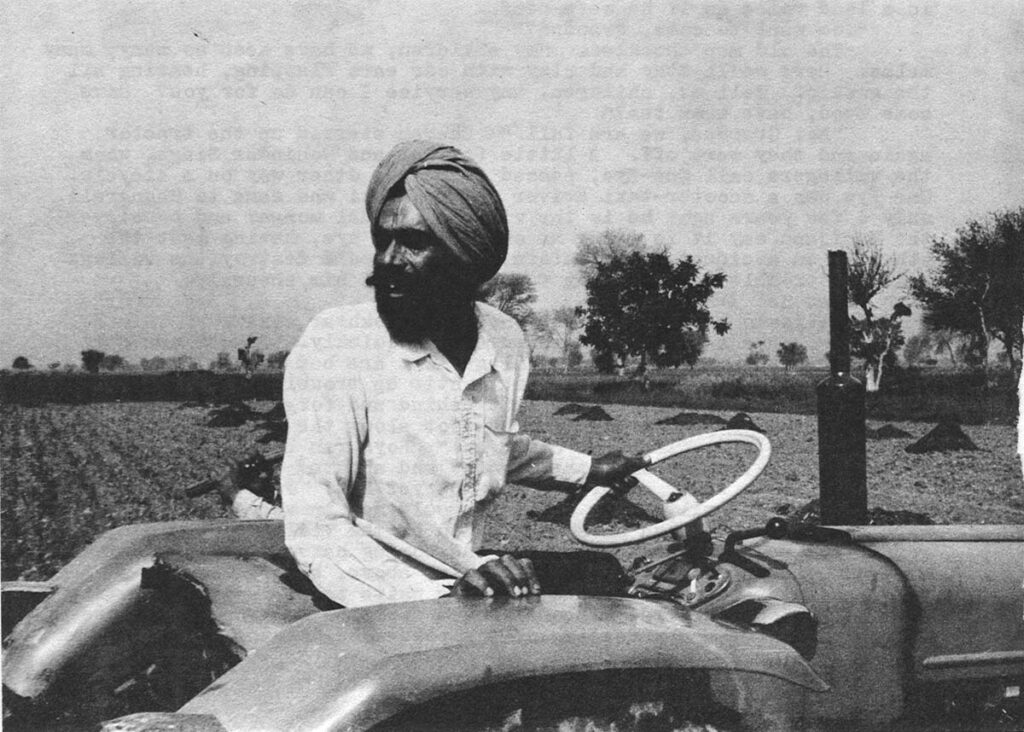
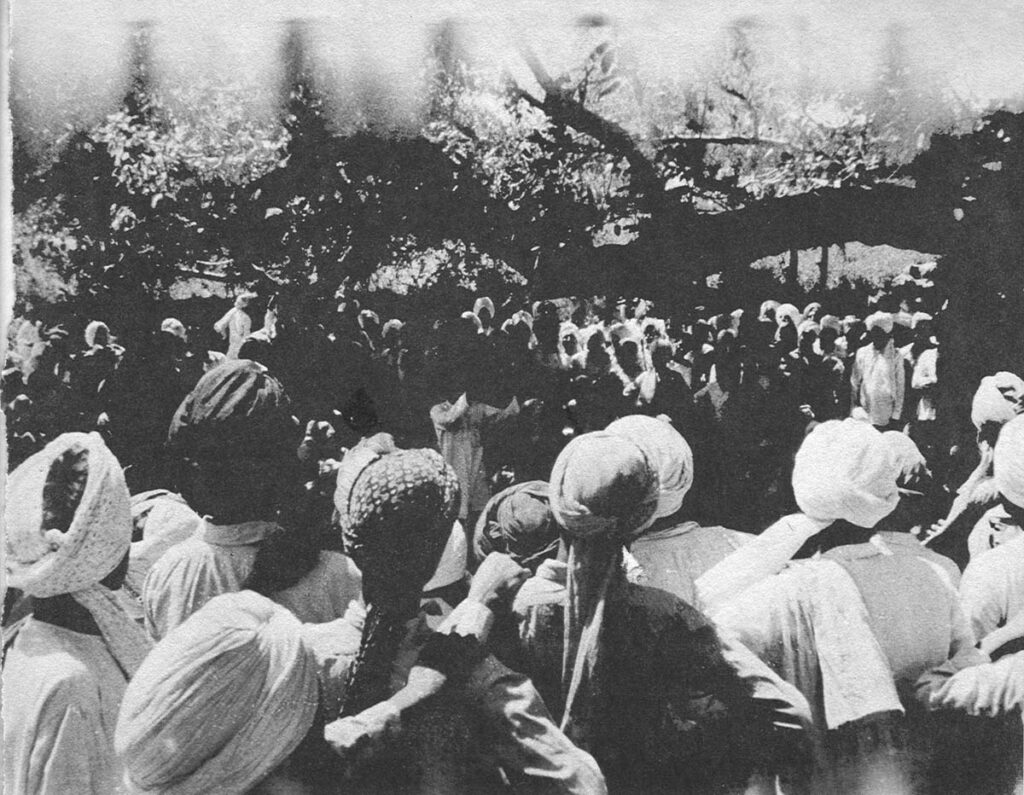
A man selling bullock whips brandished them at Mukhtar. Another with a python called to him, “Look at this godly creature. If you feed him, he will look after your ancestors.” Under a banyan tree a crowd had gathered to hear a young man singing to an imagined sweetheart.
Awake, my love!
Thy eyes are heavy with dreams,
Dreams of days gone by,
When breezes were with odors woven
Does that make thee sigh
Out of black of the moonless night
Let the myriad stars thy tresses light.
Beyond some drunken farmers were dancing the bhangra, with belle tied to their ankles, brightly colored lungis and fancy waistcoats. They had formed a ring round a group of three men who beat drams and set the tempo. The men went round in a circle stamping their feet; to the beat of the drams, clapping hands, turning and twisting their bodies with joyous abandon. Sometimes one dancer leapt to the center of the circle to sing a couple of lines at the top of his lungs and then it seemed, the dance was taken up even faster, with the men, raising the arms to the sonny sky and shouting, “Ho, ho, ho!” and “O, Balley, balley!” as more men joined the frenzied whirl.
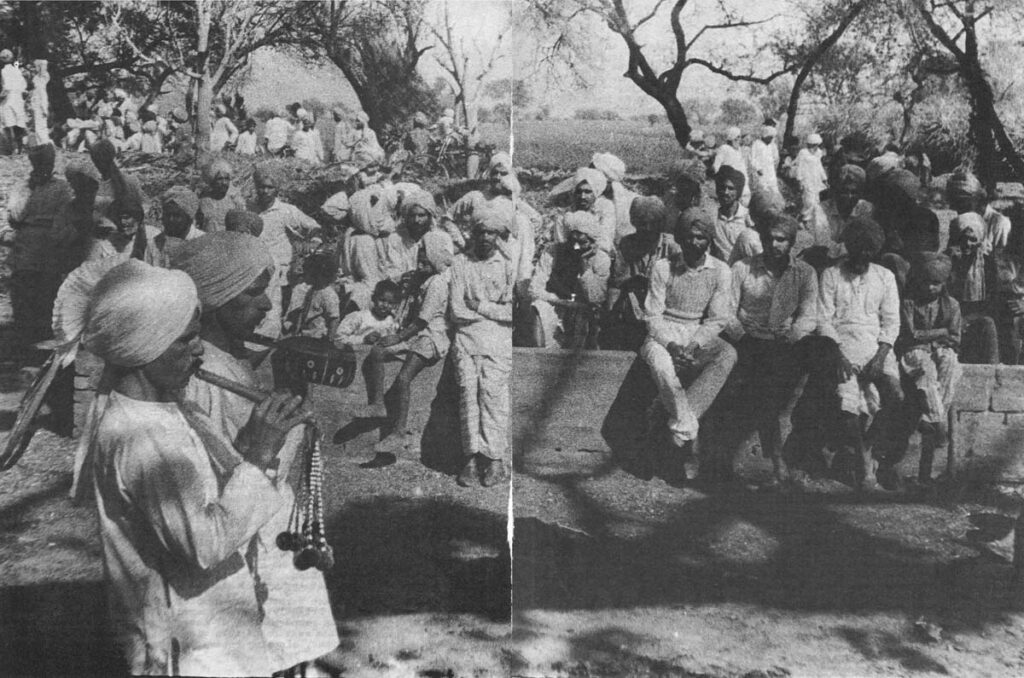
At the temple men were throwing candy at the towers or kneeling on the ground to scratch the earth, running the dirt between their fingers, to ward off disease. Beyond girls were selling sweetmeats and young men crowded up to their stands, flirting and calling out in loud voices, “How much do you charge?” “What is your rate?” ‘When a girl got angry and swung out to slap them, they would dodge a step back and say with feigned indignation, “O, I was asking the rate of the candy… Why are you so angry, young lady?” There were vendors with displays of folk tales and stands where every food imaginable was being sold amidst great swarms of flies. Outside a shop barred like a jail with a jostling mob of men pushing against it’s only window, a loudspeaker roared, “Five rupees, five rupees. Here it is, men. Five rupees. Move on, move on. Give me a fiver. Hold it.” It was the liquor shop and Mukhtar joined the crowd of men, finally reaching the window where he bought two bottles and shoved them into his belt, Punjabi style, out of sight.
Above the roar he heard Charan shouting at him and waving from the door of a dark and shady cobbler’s shop. Mukhtar joined ham and found a dozen or so men, Charan’s in-laws and their friends, squatting around on the floor, furiously drinking.
Charan’s face was flushed and beady with sweat. He roared with laughter when Mukhtar approached and said, “Chota, there is a little left, come and join us.” Mukhtar moved into the dark shop but bumped a shelf as he sat and a pair of shoes came falling down on his head.
“Now you see,” laughed Charan. “They’ll hit you in Jarg even with shoes on your head.”
Inside it was very dark and hot-and there was a great confusion of voices, some shouting, others singing.
“We don’t want to dirty more glasses. Why don’t you put it.”
“Have some. Catch it. Catch it now! What now? What are you doing there, son and father.”
“They can do whatever they like.”
Then Charan’s laughter. “They’re father and son. They’re authorized to do anything.”
Someone handed Mukhtar a full glass of liquor. He held it in his hand a moment, braced himself and then gulped in down in one measure as all Punjabis do, washing the burning liquid down afterward with another glassful of cold water.
“He’s our uncle. He may pay or he may not,” someone else shouted.
“Tomorrow it’s my turn. I’ll settle my account with him!”
“Who knows about tomorrow?” It was Charan shouting and laughing. You may be dead by tonight. Drink up!”
Somebody handed Mukhtar another glass and then after what seemed only a moment still another. He pulled out his bottles to a man who seemed to be doing the pouring amidst a great burst of laughter. Now Mukhtar seemed to hear only nonsensical snatches of conversations around him. “You are the cashier, we’ll account for everything when we reach home.”
“I want to go to make water.”
“Yes, I know. I know where you’re going.” Laughter.
“Small?” Someone was pouring a glass.
“Yes. I want to survive for some years.”‘
“Here comes Amar’s. Here comes Amar’s five rupees.”
“But he abused me, that bastard.”
“He’s not that type of person.” Charan’s voice now. “We’ll enjoy, now and attend to him later.”
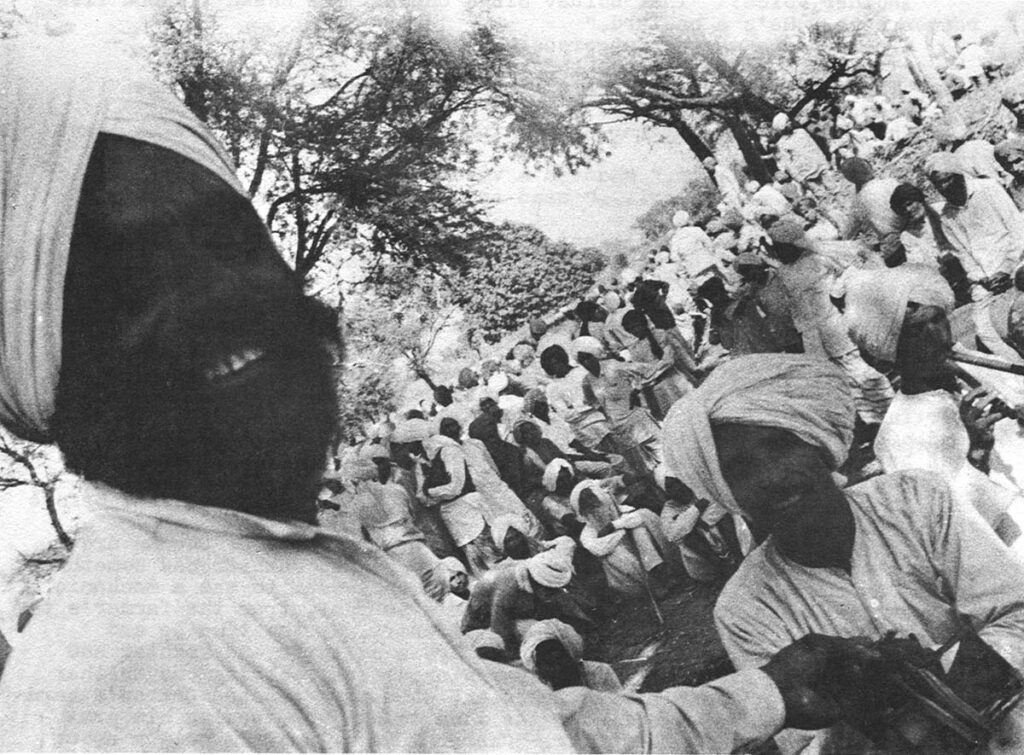
The laughter went round and round and it seemed to Mukhtar the cobbler’s dark little shop went round and round also. Somehow he found himself drinking a fourth glass and then he heard a voice quite near loudly singing: “Your face is so beautiful. It’s breaking my heart. I can’t sleep at night. I lie in my bed but if I move my head I shall break my skull….” Then a different voice sang, “When General Nasser claimed, ‘We’ll nationalize the Suez Canal….’ This side Asia had fall milk and that side Europe went without evening tea. They conspired in London and Pandit Nehru conspired in Delhi.” “Nehru, Nehru!” a drunken voice shouted. “We gave these stupids their freedom only yesterday,” said another slurred voice. The first singing voice got loader again, “There is a beautiful cot with my long hair…and keep my skin for your bedding…My skull will make a beautiful glass to make my beloved drunk… If my beloved is not yet happy, I damn this bloody courtship if I can’t satisfy her.”
Another voice: “That Buldev Singh Cheena. He doesn’t spend five rupees each. He’s a bastard.”
“That Cheena can be dangerous.”
“I’ve seen you too drunk before.”
“This drunken party is none compared to some in our village.”
“Hey, what happened here?”
Then Charan was tugging at Mukhtar’s shoulder. “We have to leave the trolley.”
“He’s named silver,” shouted a voice.
“He shines as silver…. ” said another but the rest was lost in laughter.
Coming out in the brilliant sunshine from the dark of the cobbler’s shop, the world whirled and whirled around in Mukhtar’s eyes. Somehow they were no longer in the marketplace but standing in a great circle of people and two men were blowing flutes and Charan was standing by them and pointing to them and laughing in his great burst of laughter where you could even see down his throat. And then the two men changed into two little exhausted, wet-faced boys playing toy trumpets and they had reached the Gurdwara and climbed on the tractor and Charan was starting the engine and still the toy trumpets could be heard. A truckload of women went by and just as they turned onto the road one of them lost her scarf and it went flattering down to the dust.
“She lost her scarf,” Muktar mumbled.
Charan laughed. “She’ll be lucky not to lose more than that before the evening.”
Later, after having left the trolley at its owner’s. Charan drove the tractor to his in-laws’ house and there he and Mukhtar had something, to eat and more to drink; from his in-laws they went to see a mechanic he knew; from the mechanic’s to a farmer’s in Pyal, from the farmer’s to another crony’s in Majari and so on. In short, by the time he and Mukhtar reached the village, both were drunk as lords and Mukhtar and Charan had their arms over each other’s shoulders, holding one another on the tractor. It was already late and when they reached Charan’s barnyard, Mukhtar staggered off down the road to his hat., waving his arms and breathing heavily, muttering, “Charan is a prince. A prince among men!”
The crippled Peloo, waked from his dreams by the tractor’s roar, stumbled to open the yard gate and with cries and Bobs from his twisted body, helped Charan to safely drive the tractor into its shed. Then Charan stumbled to the gate and with drowsy, drunken eyes looked now at the village pond, now at the banyan tree. Peloo shut the gate and its steel hinges clanked behind him. Behind Charan came running Jubru, his dog, who sniffed at his master’s heels and growled at the darkness, affirming in Charan’s mind that the black shadows on the pond’s surface were not shadows but a dream; that this gigantic tree with its fantastic outspreading branches, this unfathomable sky, this mournful open stretch of barren earth had something blessed, something eternal to say to him. The past was trivial and tedious, the future insignificant and all he had was this magic night, this one night of life. And Charan listened, first to Jubru’s growl…then to the midnight silence and he told himself in his drunkenness that he was immortal and would never die. The pond shivered in a, silvery light, a silver he had not seen before and the sky, the black shadows of the banyan tree all whispered to him that somewhere he would find his destiny, a love of all men and a reward for it all.
But as he stared earnestly in the distance, he saw instead savage men rushing forward with swords and spears, he heard curses and screams and unheeded cries for help, he saw women with babies in their arms leap into the silvery pond and he saw himself trying to defend his home and family against hundreds of crazed, bloody attackers. Charan shook his head drunkenly as if the dark shadows, the moonlight, the banyan tree had betrayed him. For a moment he had felt free, wholly alive, and now his life seemed once more a fragile thing, without significance. “Ghosts,” he whispered, “Ghosts, Jubru.” And then Charan broke into a great peal of laughter as he staggered homeward across the buried bones of the Moslems.
“Ghosts! I’ll eat them!”
The Massacre
“It rained and rained that year, more rain than there has been before or since.” The red light of the open fire cast strange flickering shadows on Gurdial’s handsome face, giving it a cadaverous, ghastly appearance. It was late evening and some of the Harijans were assembled in his courtyard; Gurdial, with a poultry farm of two thousand birds, was the richest Chamar in the village. The firelight cast a flickering halo over the group of men and boys, who huddled together, sitting or squatting on the ground in a semi-circle around Gurdial’s feet. He and two Harijan elders sat cross-legged on a charpoy and, like their audience, lit a single cigarette from time to time and passed it one man to another, as Harijans do. Although the moon was shining, the things outside the red halo from the fire looked impenetrable and dark. The men on the ground were partly dazzled by this light, and they could see only a portion of the lane outside, and the cattle in the yard were hardly noticeable in the gloom except for the sound of their, munching and snuffling. Over the fire, Gurdial’s wife had fixed a cauldron for boiling water and she bent over it, standing in the smoke of the fire and waiting for the first signs of bubbles. Bhoondi, the barn cleaner, and his oldest son, Sher, sat side by side in silence, deep in thought; Gurmel twisted his moustache and looked into the fire; Mukhtar’s shadow danced over him, and at times it hid and at times revealed his handsome face. Everyone was resting from the day’s hard labor, thinking, and listening to Gurdial recount the old familiar story of the massacre.
Some thirty steps from the fire, just outside the gate by the edge of the road, stood a large Moslem gravestone leaning over to one side. As Gurdial spoke, Mukhtar thought there was something very melancholy about that lonely grave. He could almost hear its silence and feel the presence of the soul of the unknown being who lived beneath that tombstone.
“In July of that year there was a rumor there would be a separate state of Pakistan for the Moslems,” Gurdial spoke. “Except for as Harijan Sikhs, all the villagers in Ghungrali were Moslems. They used to tell as, ‘You get your hair shaved and we’ll get Pakistan all the way down to Delhi, even Agra.’ Then after some days we came to know that the Pakistan boundary would be north, above Amritsar. On the first of August we came to know that in Calcutta, Hindus had began killing Moslems. On the second of August there was firing in the night at Gharala village, just two miles from here. Sikhs opened fire on Moslems and sixteen or seventeen were killed. It was a small Moslem village then. On the third of August, the same thing happened in Muttoin, a village seven miles from us. Only two were killed. Both were planned attacks in the night. On the fourth it happened at Naulari, a place they called ‘Nine Beads,’ six miles from us, a fourth attack arranged by the Sikhs. Almost all the Moslems were killed, some seven hundred houses full of people. Those who could escape, they all came here. Then all Ghungrali’s Moslems decided to move from here to Malerkotla, a Moslem strongpoint then which the army was defending. But then a second decision was taken not to leave this village. ‘We won’t go,’ they said. ‘We’ll fight back.’ They had no idea so many thousands would come later to attack.”
There was a silence. Gurdial reached into his shirt and pulled out a cigarette, lit it and after two puffs passed it on to Gurmel. The fire flared up and in the gloom along the road flickered the shadow of the tombstone.
“Aye, thousands….” Gurmel said reluctantly. “Such a cutting and harvesting’ “
“After that some of as Harijans went to Majari, “Gurdial continued, “at that time it was already a Sikh village. Some went to their relatives. All the old men, women and children left.”
“We young men couldn’t go,” said Gurmel. “We started watching Ghungrali by night, taking turns of fifty to sixty men, Moslems and Harijans alike. We had to obey them.”
“The young men, those who were confident they could take care of themselves, they stayed to look after their property,” corrected Gurdial. “I used to come and keep people informed, going between here and Majari.”
Gurmel was silent, thinking how Gurdial had made the start of his present fortune by looting.
“The Sikhs were making a plan in Majari,” Gurdial went on with, a yawn. “There were two Mohammeden families in Ghungrali, the Faujukes and the Dukales, the richest men in the village who had served the Sikh jathas during the Guru Ka Bagh Morcha during the fight against the British for independence in the 1930’s. I called both heads of the family to my place. I told them there would be an attack on Ghungrali but the Sikhs wanted to plan a way to save them.
“Fauju Khan said, ‘If you can save the whole village, that’s good. They are all brothers and relatives. We won’t abandon them.’ But, Dule Khan, who was not as brave, agreed to our proposal. This was the plan I passed on to them: ‘Whom you want to save, you bring to your big houses and we will hang signboards outside informing the attackers that you are our friends and have done much good for the Sikhs in the past in the fight against the British.’
“Then I went back to Majari and told the Jats that up to this extent had the two Moslem families agreed. Then the Jat leaders told me their plan. There was a common grazing field in those days, where all the cattle of Majari went during the day. When the shepherds brought the cattle back to Majari in the afternoon, that would be the signal for the start of the attack. It would come through the Harijan quarter of Ghungrali, where we are sitting now. I told Fauja Khan and Dale Khan early in the morning of that day that the attack would be in the afternoon. They were ready to fight back as the jathas surrounded the village at daybreak. From then on no one could slip away. There were seven hundred Moslem families living in Ghungrali then; the village was mach, much larger at that time. There were also as many refugees from nearby villages. Perhaps there were twenty thousand people in all.
“At two o’clock in the afternoon Dogra soldiers opened fire. The soldiers were clean-shaven Hindus. A Hindu general sent them in. The Moslems had muzzle-loading rifles. They answered the fire. From outside the barrage was much heavier. Some Moslems had positions on the tops of the outer houses. All the young men of the Harijans, Mazhbis and Chamars together, gathered in the courtyard outside their houses before a big iron gate into the Moslem quarter.”
“That gate was open, I remember,” Gurmel affirmed. “We watched them come from the tops of the houses. Tens of thousands they were. You could see human beings like herds of sheep surrounding the village. Countless. Everywhere you looked you saw people. This village was very strong. The Jats knew it and were afraid. They didn’t dare attack before the army came. At about four o’clock in the afternoon those Dogra soldiers brought in machine guns. From the road to Majari they started firing. I remember we locked our house and gathered before that big gate. All these three sides of the village were surrounded by men but the side toward Ghazipur was open so some were trying to escape.”
“When the Moslems saw they couldn’t cope with the heavy incoming fire,” Gurdial continued, “all ran back to their own houses, as did the Harijans. Then the Sikhs came running into the streets of the Harijan side. They demanded we give them kerosene and matches end each Harijan had to provide as a test of loyalty. These Sikhs came rushing in with spears, gandasas and swords. The firing stopped and thousand upon thousands of men came pouring into these streets.”
“Each of as had to give matchboxes and kerosene oil. We had sand on the roofs to stop fires.”
Gurdial’s voice rose. “The Sikhs shouted, ‘Kill these kaffirs!” and there was a deafening roar of ‘Jo Bole So Nahal Sat Sri Akal!’ ‘Who speaks he is fall of the name of God!’ We crouched in our houses. We could hear the screams of women and the shouts of our Moslem friends, ‘Help us! We are being killed!’ We were to learn what happened to the two rich families. When a Sikh came to hang a board on the outside of the house of Fauju Khan, someone from inside the house, some say Fauju Khan himself, ran a spear through the man and killed him. When that Sikh fell, hundreds attacked those two rich houses also.”
“Fauja Khan was killed on his threshold,” said Gurmel. “It was a huge family. After that it just ran like fire. Men who were hungry for generations just started raping women right in the courtyards. Some of the women jumped into wells – those who wouldn’t allow the touch of another man’s hands. I saw a woman holding a child. They tore the baby from her and speared him in the air in front of her eyes.”
“I saw no rapes,” said Gurdial angrily, “Nobody could think of rape. It was like a burning pyre, the village. It was a moment when, sons forget their mothers and mothers forget their sons. It was a mass panic.”
“Did you rape, Gurmel?” someone asked.
“As God may not bring lies on my tongue, I never killed or raped,” swore Gurmel. “At that time I was a soft boy. But I saw many others do it.”
Gurdial continued. “Some were killed inside their houses, others while trying to escape. Many ran into the sugar cane fields; some of the Moslems who lived in Ghungrali escaped but most of the refugee Moslems fell, not knowing where to ran. Women jumped into the wells of their courtyards or flung themselves from the rooftops into the streets. Some jumped into ponds and drowned themselves. We had the heaviest rain in memory that year and all the ponds were flooded.”
Old Bhoondi, whose real name was Kishan Singh but whom everyone called “Little Bug,” cleared his throat and spoke for the first time.
“I ran when the attack came. Before that the Moslems wouldn’t let as go.”
Someone laughed. “O, Bhoondi, what a budmash you are!”
“No, no, maharaj, don’t say that. The wells were filled with women and there was a cutting and harvesting of human heads. I ran to a sugar cane field and hid myself there. That’s all I know.”
“O, Bhoondi, tell as more.”
“That’s all I know. I have done nothing except spend my life cleaning people’s barns. That’s all. Bas!”
But they persuaded him to go on.
“I heard the fire open from the Majari side and saw a lot of men running through the streets. I was afraid only that I may not be caught and killed. A Jat shouted at me, “Run away! Leave the village or we’ll kill you!’ I just ran to a sugar cane field and those hooligans started cutting and harvesting and picking up utensils and other things. My children were still inside my house, pray to God they’d locked the door! I ran into that field and dug a ditch and pulled canes around me without taking my breath inside my chest, without moving or leaving that place until night. My children came searching for me in the field lest someone had killed me. It was dark and there was much shrieking and yelling. ‘O, people, we are being killed! We are being looted! Save us!’ I heard the fire of a Bren gun. Kar! Kar! Kar! Some hungry persons were riding the women, I saw a lot, there in the dark.”
Everyone looked at the tombstone in silence. Somewhere, probably near the banyan tree, came the mournful sound of a bird: “Trrr, trrr, trrr…”
“There are many terrible things in the world,” remarked Mukhtar.
“Many, many!” affirmed Bhoondi, who drew nearer his neighbors, just as if he had grown apprehensive.
“After the attack, all of as went to Majjari,” Gurdial continued in an undertone. One of my buffaloes was left behind. I saw some people, some of them had gone already, but some people were taking away bales of loot on their heads.”
“I also looted some grains and utensils from the Moslems,” said Gurmel, watching Gurdial closely.
But the other was too clever for such admissions. He said, “I had a round in this street. The dead bodies were jammed into the wells, the courtyards, the houses, the outskirts. After the attack, it took three months before people stopped coming to dig in the ashes. The day after the attack, the police came and brought as Harijans with them. They made us take wood and whatever we could find and burn the bodies. There were no vultures, no dogs around. Even six months later the stench in Ghungrali was terrible. Like the children, most of the women had died. I would wager less than two per cent of the women escaped. Only one of the Moslems ever came back. It was about two and a half years later. His sons had been lost in the attack and he did not know whether they’d been killed or just lost in the escape. People treated him nicely. His name was Buga Numindar.”
“In Bhambadi,” said Mukhtar, suddenly wanting to confirm the goodness of human nature, “the Sikhs protected a Moslem family which still lives there. Those four brothers who rent land near Charan’s.”
“If the number of Moslem families in a village was small,” Gurdial said, “their Sikh neighbors usually hid them. But the Sikhs said they were afraid of this village because it was so big and they felt they must attack it. It was the custom then to send one person from each family to join in the attack, otherwise the Sikhs would kill you. Because I had been in the military, both sides had an impression I mast have a rifle hidden somewhere, stolen from the army, and both sides wanted me.”
“After the attack, we Harijans had in mind that ‘Now we’ll get the land.’ We were not aware even that there were Jat Sikh farmers living in Pakistan. We thought, ‘Now this land is ours.’ But after only fifteen days the Jat refugees came. We were cultivating the land for harvest, on our own allotments. But the government gave the land to them. They confirmed how much each had had in Pakistan and gave them the land accordingly even though our families had lived in Ghungrali for generations and generations. When the refugees took over the land, they promised as two-thirds for tilling it for them and one-third of the harvest would go to them. But little by little they reduced our share. Now of the twenty-two acres of common land owned by us, we get a third of the earnings but all the money goes to build a hall or pave streets.”
“Yes,” agreed Gurdial. “We all assumed that once the Moslems were gone we would get their land. We all took possession. I harvested two hundred maunds of grams that year and ploughed the lands. But we had to vacate.”
“Yes, and now we are yoked by these Jats.”
“Ah, bat there is much difference between these Jats and the Moslems. We never dared touch a Moslem. The Moslems hated as.” Gurdial sighed. “Now we can touch the drinking glasses of these Jats. The Moslems wouldn’t let a Harijan cross his threshold. We were virtual serfs in those days.”
Gurdial, having finished his story, glanced at his listeners. They all were silent, their eyes still fixed on him. The water was boiling and his wife removed it from the fire. The men thought over what had been said. Life was so fearful and wonderful in the Punjab that, however much the horror or strangeness of a story, it always evokes in the minds of listeners that which has been in their lives. Alone among the audience, Muktar might listen with skepticism, mentally noting the contradictions. But the firelight flickering on the tombstone in the lane, the massive blackness of the banyan tree at night, the wide endless plain that stretched beyond the horizon in every direction and was the only world they knew, these and the fates of the men gathered in the courtyard were in themselves so wonderful or fearful that the lurid unreality of Gurdial’s and Gurmel’s words paled and mingled with the real. Each of them, even the youngest, had grown up amidst crumbling Moslem graves and the sealed old wells still filled with the skeletons of women and children.
Charan
When I was a boy, I suppose like my boys, I wanted to be a doctor or an engineer. We were very prosperous in those days. And then the partition of India and Pakistan in 1947 changed everything.
I was in the ninth class at school. It was August. A month before, in late summer, we heard of an attack on a single Sikh village in a Moslem area. In our region, all the villages were Sikh and no one was too worried. But we sent five hundred men to the village under attack and when those men returned they told as how furious the Moslems were and that the police and government were not helping the Sikhs. Gradually people began to become afraid and start to think of going southeast, beyond Amritsar.
It took our village a month, a whole month, to reach a decision. You see, it meant leaving everything, leaving with empty hands. And it was a rich village. Men like my father were real gentlemen farmers who had never labored in their lives. It takes time when you have to face the collapse of so much of your life. But finally we agreed to a central meeting place at a canal. We just left oar house as it was, taking a few clothes, money and enough food to last as ten days. It was to take as twenty-seven to reach the frontier.*
The day we left some men were still plowing in the fields. We shouted to them, “Let’s go, there’s no point in staying any longer.” It was when we saw the government wouldn’t protect as, that we really decided to flee. With oar caravan we were lucky. Others had much more trouble and some were completely wiped out on the way. The fields were green at that time of year and along the route we could pay some food from Moslem villages. Nobody along the way was friendly but money is money and Moslem merchants would come to the caravan and sell flour for four annas a kilo in our village at about three rupees or twelve times the normal price. But we kept alive.
Our caravan was about three miles long along the canal we followed most of the way. Once twenty-five Moslems came and attacked. A dozen were soldiers and thirteen civilians. All Baluchis. They killed a bullock and destroyed two bullock carts and we all ran down into a dry canal to save ourselves. We had motorcycles and good horses and two small homemade cannon in the caravan and we were ready to march. We mounted the cannon on bullock carts. They worked like a muzzle-loading gun. When one of our men brought his cart forward, we loaded the cannon on it and fired. We killed twelve of those Moslems then and there. The rest of them ran into a deserted Sikh village. When we reached there in pursuit, we found all twenty-five rifles and twelve bodies. The others had hidden but we surrounded the village and caught eight of them. We asked them, “Why did you, attack us?” They answered, “It’s oar own sweet will. Allah-o-akbar!” We locked them into a room and set the house on fire. After that we had guns and ammunition with as. At the start, twenty-two thousand bullock carts were moving, if you put all the caravans from Lyallpur, Sargodha, and Gujranwala districts together plus those from the town of Sailkot. We had people from all those districts. When we reached the riverside to cross over into India, the Pakistan government blocked the bridge. We stayed there for eight days in a big huge camp. Then a small squadron of Moslem soldiers came. They said they’d open the bridge if they could search the people as they came across in small groups. Some crossed the bridge but they were massacred by the soldiers on the other side. It was a trick.
The next day the Gurkha military came. They crossed the bridge and would lead about fifty bullock carts at a time over and then come back and take some more in convoy. When we camped there for five days we ran out of fodder for the bullocks. Someone said there was a Gurdwara not far away where they had sugar cane and fodder. As soon as we set out to get it, some Pakistani police opened fire and killed two of our men. Pritam Singh was with as and I remember he said, “Why are we going for fodder when people are being killed?” I was just sixteen then and he was a giant of a man. Everyone in the caravan looked up to him. I remember once he told me, “This is a time when everyone has his head on his palm. There is no way out, my son. Before these bullets, you shall know your real strength.” The Gurkhas saved as that time by opening fire. They also gave as big dreams of uncooked rice. Everyone had run out of food. We were afraid to go to Lahore so we took a seven-day detour over thirty miles on small dirt roads. Most of the wells were filled with poison or corpses and there was no water. Decapitated heads and corpses were lying in the bushes and ditches like sheep.
*A somewhat different version of this flight from Pakistan is given by Charan’s sister, Surjit, in RC-4, “The Thorn.”
The army dug some tubewells, filled tanks and put some medicine in it. When we reached Kasur, which was to be a big battleground again in the Indian-Pakistan war eighteen years later, again the Pakistani police searched as. They even took our kirpans and spears. When we complained to the Gurkhas that they took our kirpans, the soldiers raided the Moslem police station and said, “Everything is happening in the name of religion and yet you deprived them of their religious symbols.” So they gave our swords back and we crossed Kasur and camped, just two miles inside Pakistan. That was when the heavy rains started. The army led as into Ferozepur on the Indian side. Two hundred bullock carts washed away near Ferozepur with all the people inside them. A nine-foot high wall of water came down that riverbed. There were the heaviest rains I ever saw that year.
The rainwater flooded everywhere and two hundred bullock carts washed away. All those men, women and children. Waves higher than a man’s head. The rest of the caravan, about half of it, which got caught in Pakistan, had to wait for twenty days. That dry gully just became a rushing torrent in minutes. Eventually the army made a bridge across it. We were lucky to have just crossed when the floods came. But because of the rains and starvation, just as we reached Ferozepur, cholera broke out and many died, four in our own family. My brother, a sister, one cousin and an uncle. Everyone in the family was sick except for my father, my uncle Sarvan and myself. One cousin went blind from cholera. Then we started from Ferozepur towards Moga town. On the way we went to a wine shop and bought some liquor, two bottles of hard liquor, and we beat some raw onion and took juice out of it and mixed it with the liquor. We gave it to the sick ones. Two tablespoons for the adults and one for a child. Everyone started to improve. When we moved inside India, people along the roadside gave as chapattis, dhal, vegetables, tea, pickles and gur. All were Sikh or Hindu villages.
I lost many of my friends along the way. Once when we were moving toward Lahore, those without bullock carts were told by some Baluchi police that they would be provided with motors and lorries. There were about twenty thousand people walking with the caravan and they gathered in the main square of the town of Jarawala. But the Baluchis had set machineguns up on the rooftops and they opened fire with those and Bren guns and rifles. The town was surrounded on all sides by Baluchis bat a few people escaped and lived to tell about it. They tried to play the same kind of a trick on us. They told as to camp in this one place for a night, to wait for a Moslem caravan to pass by on the way to India. But we refused. Then some of as thought, “Why not?” and agreed. But just then some Madrasi soldiers came along and told as to move up and join some two thousand bullock carts already set up ahead. I guess that saved us.
In India we came to Bija, our ancestral village, just two miles from Ghungrali. We had come two hundred and fifty miles, but it seemed like a thousand. We got a house there and stayed for a month. One of my uncle’s had married there and his wife’s brother was the local zaildar or tax collector. Many of the surrounding villages had been burned down or looted. There was nothing in these villages. Just houses burned to the ground. Bija had been about one quarter Moslem and when they had fled the zaildar had collected their possessions and saved their crops. He came on horseback to meet as when he came to know we were approaching. We were eight families traveling together by then. Of these eight, the zaildar got his wife’s six brothers allotted land in Bija and my father and uncle, Sarvan, got allotments in Ghungrali. He had kept cots, beds, plows, yokes, seeds and implements left by the Moslems and he distributed them equally to all eight families and for a year we cultivated those lands in Bija jointly.
The first time I saw Ghungrali was about fifteen days after the massacre and just after we arrived in Bija. Not a single house was standing. Only the shell of one brick structure, a mosque, was intact. The mad hats of the Harijans had fallen in and most of the roofs were burnt off. Men had already torn down the walls of the brick houses. Others had stacked bricks from a Mosque to build a Gurdwara. Some sugar cane was standing in the fields that was all. The stench was terrible. No one could live there. The wells were full of bodies and they were just sealing them over.
At that time, my mother’s three brothers were farming in Bikaner in District Ganganagar, in Rajasthan. My uncles had some influence and had gotten twenty-five acres each allotted to them. Oar allotment in Ghungrali was permanent but the land was watered by a Persian wheel and we had never used one. We were used to canals in Pakistan. We thought farming would be better in Ganganagar, where there was also canal irrigation. So we gave our land here on a fifty-fifty basis to a Chamar sharecropper who had looted bullocks and equipment from the Moslems. Then we went off to look for better lands. We tried farming in Ganganagar itself for two years. But because of a water shortage, we could hardly get enough to live out of twenty-five acres. We raised baja, cotton, wheat and grams. But it was completely dry, practically no rain at all. It was difficult to make ends meet. So I had to work as a hired laborer in the daytime and work at my own fields at night. I was eighteen. We found a wandering cow who was able to give as twelve kilos of milk and the whole family was anxious that I ate well as I was the only man working. Even in the worst days my father never worked with h1s hands. In all my life, I have never seen him do any physical labor.
There was another village, 23TVV – they named them after the canals and they all had numbers like that – and Ramchand, a tax collector in that village, he helped me a lot. He offered as a house there and said he had fifty acres of land and enough water. We rented out our own twenty-five acres our uncle had given as and joined him. For the next two years I was a sharecropper for him on a fifty-fifty basis. Yes, most of my life I’ve worked like a Harijan. I had to. There was no alternative.
After that we were a little better settled, we felt. We took on another twenty-five acres on rent; an official gave it to me on contract. There was just myself, father, mother and the four girls. My oldest sister, Surjit, she was staying with as although she was already married since her husband was taking opium. Finally, I was working a fall one hundred acres on a sharecrop basis. I was able to rent fifty of this for 1,300 rupees a year. Then I borrowed another pair of bullocks so I had two and hired a laborer. Out of the land I took on contract, a fourth was irrigated and the rest rain-fed. There was a good rain that year so I borrowed about twenty pairs of bullocks I had a good social circle there – and sowed oil seeds and mustard, about ten acres of gram and twenty-five acres of wheat. Then I made another arrangement with my landlord, the tax collector; instead of fifty-fifty on fifty acres, would he take 25 per cent on all one hundred? Ram Chand was a Hind Kshatriya and a fine man. That year we had three hundred maunds of wheat, one hundred maunds of oil seed and fifty maunds of gram. We made a big fortune that harvest season. With that crop I took a pair of bullocks I had hired on interest and bought them, paid 1,300 rupees to the government on our Ghungrali allotment and Ram Chand his 25 per cent and all oar small debts. Above all, I saved enough stocks to bay plenty of food and everything. From then on, everything began to go smooth and nice. We built a mud house in the fields, at a distance of about two miles from the nearest village.
Then I started farming fifty acres for Ram Chand and only twenty-five acres for myself. At that time, we began using very, very modern equipment. A plow with three disks. Very sandy land there. I used to take only a third as long for plowing and sowing. Then in 1952, they had completed the consolidation of land in Ghungrali. In other villages land consolidation led to a lot of murders, but in Ghungrali it had gone peacefully since everyone had come from Pakistan and was starting out fresh. At the same time, the Rajasthan government passed a bill that no one could be allotted land in two states. We were asked to choose, where did we want to settle down, Ganganagar or the Punjab? In 1953, the government started advancing low-interest loans for tubewells, which meant we wouldn’t have to farm with a Persian wheel. Sarvan and father took a combined loan for 2,500 rupees for a tubewell. Then1we left Ganganagar and came back to settle in Ghungrali for good. Eventually the whole family, all my mother’s relatives but one older sister, came back to the Punjab.
Those were the hardest years of my life. But you know, it’s odd, but they were also the happiest. Maybe work is good for a man. I used to labor eighteen hours a day with my hands. Seems like I never stopped. There was a system of canals there and the main outlet in our village had sand dunes and grass, perhaps the height at the sides was twelve feet. Every time you irrigated fifty acres you had to go work on the canal. And I had to do double since I was irrigating a hundred acres. But I would finish double the work before the others would finish theirs. Then we’d play cabaddi. I used to enjoy that work very much. All young men and always cutting jokes. They used to find the place for me where you had to throw the sand the highest, ten or twelve feet. How we used to laugh and enjoy ourselves. It never occurred to me to get discouraged. Looking back, I’d say I was overconfident. But how I would enjoy reliving those days, hard as it was!
I guess there’s not much more to my story, such as it is. We married off our second sister in 1952. The man had already bees in Malaysia for two years. He was a watchman there in a cooperative market and before that had been in the police. He has a license to give his money on interest and he buys cows to give to people on hire purchase. He has two houses in Kuala Lumpur. But the youngest sister’s husband – he’s also a watchman in Kuala Lumpur – he’s the richest. She went out to marry another man but when he was killed in a motor accident my other sister wrote and said, “What will we do? Send her back or try to find another marriage here.” We said, “Why not try there first,” and her second husband now owns houses in Chandigahr and sends his children to a fine English-language school there. He’s a moneylender and even his Chinese bank manager, who gets a large salary, takes loans from him.
In 1954, the year after I started farming in Ghungrali my father arranged my marriage. For a dowry I got one bicycle and a big wooden chest and some sets of kitchen utensils. We spent only 500 rupees each on the marriages of my sisters. In 1955, we married off the third sister. Her husband is a draftsman in Ludhiana. When she was married we introduced a new system in Ghungrali. We said that the marriage party would be sent to the in-laws’ village for only one day, not three as is the custom. People started teasing as but we didn’t bother about them. Now many follow our example. That’s one thing you have to give my father credit for: he’ll try anything new.
Honor
In a few months Charan would be forty, a man so tall he towered over almost all the villagers. His face was dark and shadowed around the eyes but underneath his heavy black eyebrows the eyes themselves sparkled with life and with his long black hair, bushy unkempt beard and broad shoulders he had a look of great physical strength and vitality. Until he laughed, Charan might seem to a stranger a man of a singularly brutal and ferocious appearance; they could believe the stories of how he had cursed and beaten his laborers. But when he laughed, with all his teeth flashing in a laugh so deep you could see down into his throat, Charan seemed the very embodiment of human joy. You felt he was possessed of some almost superhuman source of life and when he left his friends they often felt a sense of anticlimax and loss. His attacks of asthma had grown worse in recent years and daring a bad one, when he lay back weak and lifeless on his bed, a horrible, scraping, rattling sound rose from deep inside his throat and chest as he gasped for breath, like the very sound of death itself. But it was the man’s laughter you, remembered. Like a pond choked with weeds and fish and flying insects, Charan seemed as if he were being consumed by the very life within him.
Like many very large men of ferocious visage, Charan was in fact very gentle. He used to say, “There are three kinds of drank Punjabis. The first worries about his bullocks and runs to water and feed them. The second are like Sindar and fire a shot in the air. The third get a gun or a sword and go off after those with whom they have enmity; they are fools. I would never drink with a man I had a grudge against.”
Indeed, Charan had only been in two serious fights in his life. Both times, of course, it had been a question of honor. There was a popular saying in Ghungrali that most fights and factions revolve around wealth, women and land and this had been true for Charan.
The first had taken place six years before. It was during the hottest week in May and a neighbor, who had some canal water to spare, had agreed to let Charan, divert its flow for two hours to irrigate his sugar cane.
It was late at night. Charan, accompanied by Scooter, who was then his laborer, met Charan’s uncle, Sarvan, and his two cousins, Dhakel and Sindar, under three oak trees which used to stand between their wells but were cut down some years back.
“Where do you think you’re going?” asked Sarvan, who was weaving and seemed drunk.
“I’m going to take water from Kaka’s canal for my cane,” Charan replied.
Sarvan, although an opium eater, drank but little as a rule but now he was staggering. The two young men, not staggering but pausing on each foot, were drunk as well.
Scooter slipped off as the men talked and opened the channel into Charan’s cane field.
Sarvan, ordinarily a modest, grey-bearded shrunken old man, noticed where Scooter had gone and drunk, red with anger and sweating, shoved Charan with his bony fingers.
“He lent us water, not you,” the old man cried.
“Let us go to him and decide,” said Charan, trying to control his temper.
At this point, Dhakel, who was no more than seventeen at the time and was only beginning to develop the humble and mild manner he would have as a man, lurched toward Charan and shouted, “I’ll rape your mother, you bastard. That’s our water!” Sindar, who was carrying a kirpan said nothing, but stood fingering the sword’s edge foolishly. As a precaution, Charan ran back to his tool shed where he kept a spear and carried it back to where the three drunks were standing under the oak trees. He made as if to pass and when Sarvan barred his way Charan raised the spear and the old man retreated. This infuriated Dhakel who also lunged at Charan but staggered backward again when the spear was raised in his direction.
In the meantime, Kaka Singh, the neighbor who had loaned them the water, heard the shouting and came running from his fields.
“Why are you quarrelling, uncle and nephew?” he shouted.
“It’s you,” said Charan. “You are the root cause of this quarrel. You told me I could have two hours of your water and it seems you told these three also. Well, which is it?”
“To you. It’s you to whom I gave the water. But don t quarrel now. You take one hour and give them one hour. And throw that spear away.”
Charan threw the spear down, cursing the confusion. But as he did so, Sarvan and his young son came from behind and grabbed Charan by his arms. He slipped through them, seized both by their hair and threw them to the ground. They rose again and rushed him and he threw them to the ground a second time. Kaka Singh, not wanting to get involved in a family quarrel, retreated to his fields. Sindar ran back and forth, waving the kirpan and shouting but not daring to swing it since he couldn’t tell who was who in the darkness.
Scooter, seeing the fight, crept up behind Sindar and grabbed the sword away from him, then turned and with the kirpan still in hand ran as fast as he could across the fields toward the village. His legs were so short that, seen from behind, they seemed much lower down than those of other man and with his thickset body, white-fringed beard and round, red face seemed a very strange spectacle as he jumped ditches, scooted down the roads and ran through the fields towards Charan’s house in the village, all the time waving the sword in his hand. And from that night on people began calling him Scooter, although his real name was Amru.
After some minutes of flaying fists, wrestling, cursing and sweating, with Charan sometimes down and Sarvan and Dhakel sometimes down, Sindar was able to seize Charan from behind and grab his testicles. At this Charan released his grip on the hair of his uncle and cousin and the three of them overpowered him, the two youths grabbing Charan’s long hair and beard and pinning his shoulders down while Sarvan ran to his well for some bricks.
“We’ll teach you not to make trouble, you bastard!” the drunken old man shouted and putting one brick below Charan’s leg and beating the leg from above with another tried to break it. Then they beat Charan’s body with their fists and the bricks until it was streaked with blood and they were exhausted. Finally the three of them left Charan there seemingly half-dead and went to wash in their well.
But no sooner had they left him then he staggered out in the field and, his face and body bloodied, his clothes torn and his long hair streaming like a madman, he began shouting at them, “Now I’ll fuck your sister! I’ll rape your mother!”
From their well, Sarvan and Dhakel shouted back, “You come here, you bastard.”
Charan seized a long staff from the field and shouted, “You come forward, cowards!”
At this moment, Charan’s father, Sadhu Singh, accompanied by old Pritam Singh, the two of them summoned by Scooter, came running up the road, shouting, “What is the matter?”
Sarvan, his old face redder with anger than ever, shouted back, “We have taught a lesson to your son, Brother! We have taught your brave son how to water his fields!”
Sadhu was furious when he saw his younger brother in such a maniacal state. “Now do whatever you, want, Sarvan. I’ll see who touches his water, by God! Now you have enjoyed beating him to the full. “
As the two old men abused one another across the field, Charan stumbled over to Kaka’s canal and reopened the flow of water into his sugar cane field. “Look I’m watering again!” he shouted like he had gone out of his senses. “You can’t stop me from watering my fields. Now do whatever you want. I’ll see who touches this water! You have beaten me all you can and I’m still standing here and you have only beaten me because you were three! But come one by one and I’ll see how brave you are.”‘
Sadhu Singh heaped scorn on his brother. “Yes, you have beaten him to the full but he’s still standing there. Do me another favor, my younger brother, and kill him and throw him to the ground. He shouldn’t be standing!” Then Sadhu Singh lowered his voice and sneered, “You are supposed to be a wise and elderly person. If Dhakel and Charan were fighting then you should have intervened instead of joining in the fight. Now I’m sorry to see him standing. I would appreciate very much seeing him lying on the bed or slain in this field.
Years later, telling the story, Charan would conclude with a roar of laughter, “After that they all went away and I took the water and I watered seven kilos of my good maize throughout the night.”
Dhakel remembers it differently. Sometimes after a drink or two he will still say, “We taught that drunkard a lesson he won’t forget and he doesn’t bother as now.”
It is Sindar who tries to pretend the episode never occurred. Some years later he worked for Charan for ten months and when they would drink together, Sindar would sigh, “O, this liquor is a dangerous thing. We brothers were fighting like dogs that night and I’m sorry for that.” Today he denies the story altogether and says, “No, no, it’s not true. Even if we ever fought like that, it’s water over the dam. Such quarrels are a common thing in villages. But I’m dead sure I never fought with Charan. If he says so it’s a lie, a damn big lie.”
The subject is strictly forbidden around old Sarvan. Only a few people know that a year and a half after the fight on the eve of Dhakel’s marriage, Sarvan brought the village sarpanch to his brother’s house and began to weep and plea forgiveness, saying, “Look, you are my elder brother. I live next door to you. If you refuse to come to Dhakel’s wedding, what will my in-laws say? I shall be disgraced. “
“Now we speak, we talk,” says Charan, “but we can never be good friends. Can we?”
Charan’s second quarrel began four years back when he and Sadhu Singh bought four kilos of new high yielding variety wheat seeds – PV18 – from the agricultural university in nearby Ludhiana. The first year they multiplied the seed and harvested a crop of seventeen quintals. There was a great demand for the new seeds and, as the family was marrying off their last daughter to the watchman in Malaysia, they badly needed money. Charan and his father sold sixteen quintals of the grain right in the field, at the rate of five rupees a kilo, keeping about a quintal to take home for their own use in sowing the next year.
Some days later a man named Dhan Singh from the next village to the south, Bhambadi, came to Sadhu Singh and paid him two hundred rupees for some of the PV18 seeds. When he went to Charan to pick up the seeds, Charan said, “Father made a mistake. I have no seeds left.”
When the man seemed desperate and begged Charan for some of the new seeds, Charan gave him twenty-five kilos of the quintal that remained. He charged Dhan Singh one-hundred-and-twenty-five rupees and agreed to sell him some new hybrid maize seeds in the fall. That summer he planted composite 236, a new maize variety, and when the villagers saw it, the rush to buy seeds was the same. Charan and his father marketed the seed at three rupees a kilo and he gave Dhan Singh twenty kilos, so that only fifteen rupees from the original two hundred remained unaccounted for.
After that Dhan Singh went to Ghungrali three times. Each time Charan was away and Sadhu Singh would either not have money in his pocket or himself be absent from home.
Two years went by. One day while Charan was driving home from his sister, Surjit’s farm, in a nearby village, his tractor passed Dhan Singh’s bullock cart which was headed toward the market at Khanna on the Grand Trunk Road. Charan had given a small boy a lift on the tractor and he stopped at the Bhambadi junction to let the boy off just as Dhan Singh’s cart approached. Dhan Singh leapt off his cart and ran toward Charan’s tractor waving a stick, which he used to prod the bullocks.
“Aha,” shouted Dhan Singh, who had been drinking all afternoon, “now I will settle it one way or another. You are a cheat, Gurcharan Singh. You don’t give me my fifteen rupees back. It’s been over two years now.”
“What for are you so angry?”
“You don’t know? You’re pretending to be a child!”
Charan began losing his temper. “If you came with a stick, why don’t you strike me? Let me know how much I owe you. I have forgotten.”
“O, no. You know better.”
“If I know better, I know only that you owe me something instead, Dhan Singh. Because I was selling this seed to some at five rupees a kilo and you got yours for three. You owe me twenty rupees for seed.” Charan had been about to pay Dhan Singh his fifteen rupees but had become angry because he felt the other was being arrogant and insulting. Dhan Singh many times had thought to tell Charan he could forget about the small amount since he had helped him very much with the seeds, bat he now felt Charan was being arrogant and insulting.
“All right,” Dhan Singh said angrily, deciding to have it oat: with Charan once and for all. “If you are the real son of Sadhu Singh, if you are indeed the true seed of your father, you will not give me the money. But if I am the true seed of my father, I shall take it from you.”
“You are calling me a bastard. You have said I am not the real seed of my father. To pay you the money now would be like accepting the insult.”
By this time several men had heard their angry exchange and gathered near the tractor. “He is drunk and foolish,” said one man. “Let him go his way and you go your way,” said another.
Another year went by.
Dhan Singh’s fields were only two furlongs from Charan’s and the two men saw each other almost every day bat there was always silence between them. Charan drove in and out of Bhambadi village and nothing ever happened.
Then one day not long ago Charan spent an afternoon drinking with his cronies and as they drove home on his tractor they approached Bhambadi village from a little dirt road on one side. On the tractor with Charan that day were Nirmal Singh, a neighboring Jat farmer, and Kaka Singh, the ex-convict known in Ghungrali as the Bandit. As they entered a grove of trees on the outskirts of Bhambadi, Dhan Singh with a herd of buffaloes blocked the way. Waving the buffaloes off the road, Dhan Singh leapt in front of the tractor, holding his arms out and shouting to his sons, “Come, come, bring sticks and clubs! Today we won’t let him get away! We’ll settle everything!” Charan saw Dhan Singh was sober and thought, if I stop the tractor before I reach the village we’ll be badly beaten. Charan kept driving the tractor slowly forward and Dan Singh pressed his body against it, his feet dragging in the dust-and his hands outstretched.
“Get aside! Out of the way!” Charan shouted. Then, drunk, hot with anger and furious at Dhan Singh for reviving the old feud, he called, “All right! If you want to kill yourself under the tractor’s wheels keep right on!”
The tractor inched forward pushing Dhan Singh slowly back as he braced his heels in the dust of the road and looked like he would surely slip under the tractor’s big tires. As soon as he reached an open place inside the village where some people were standing, Charan stopped the tractor, leapt down and seized a large staff that was lying on the ground.
People were gathering, everyone shouting at once, four men with sticks and clubs came running to help Dhan Singh, the Bandit pulled out his switchblade knife, Nirmal leapt off the tractor and grabbed a stick that seemed to come from nowhere and the men of the village tried to thrust themselves between all the opponents. Women and children appeared in the doors and windows of all the houses and it seemed twenty men were all bellowing at the tops of their lungs at the same time.
“All right!” cried Charan, brandishing his staff like a frenzied maniac. “Let’s settle it today.”
“Leave! Leave! No, no, no! Stop fighting!”‘ men shouted.
“Either you kill me today or pay, me the money!” shrieked Dhan Singh like a madman.
“Now I won’t leave!” thundered Charan. “He has damaged my tractor!”
“Either pay me the fifteen rupees or one of as shall die!” shrieked Dhan Singh.
“If you want to die, jump in a well,” cursed a red-faced man trying with upraised arms to stop Dhan Singh from flailing out with his staff.
“I warned him, if he repeats it, I’ll fix him.” Charm, bellowed.
At least a dozen men stood with sticks and clubs raised over their heads and shouting in frenzied oaths and curses while others rushed before them shouting equally incoherently and angrily holding up their arms and trying to stop them. And all amidst a chorus of cries from the houses, stop, stop, or someone will be killed. Finally, an old white whiskered man, Dhan Singh’s father, intervened; he came running down the street, grabbed his son by the arm, angrily scolded him and dragged him forcibly into the nearest house. In a moment after Dhan Singh, red-faced and bellowing, had been shoved into a room and the women of the house bolted the door from the outside, the old father harried out and apologized to Charan. Charan grumbled, “All right. But if he does this once more I’ll get him!”
To everyone’s relief, Charan jumped on the tractor and started the engine with a great roar. Nirmal and the Bandit clambered on as it took off with a jerk and thundered down the street. Across the marketplace, Charan parked the tractor in front of the house of a cousin where he insisted on stopping for a bottle of liquor before leaving Bhambadi to show he was now cowed by that Dhan Singh.
One bottle led to another and that to three and by the time the three friends were on their way down the country road from Bhambadi to Ghungrali they were all laughing and giggling as if their brains were numbed.
“I won’t pay that son of a bitch,” Charan shouted to the night above the tractor’s roar. “I’ll prove myself a bastard if I pay him. I’ll pay him only if he comes to the panchayat, apologizes and admits his high handedness.”
“We’ll fix him.” the Bandit grinned, flashing his flick knife. “Have no worries on that score.”
“No, no, no,” said Charan, sobering up. “I was in his village and I couldn’t do anything. But now he’s afraid of us. He’s having loose motions back there in Bhambadi. He’s afraid we may beat him in the fields, but we won’t.”
The next week Charan made it a point of driving through Bhambadi on every opportunity, sometimes with two or three friends riding along on a tractor. Then one day Charan was coming from Bhambadi alone when he saw Dhan Singh and two of his sons working in their cane field not far from the road. One of the sons stood up when he saw Charan and came running toward the tractor.
“Sat Sri Akal,” Charan called warily.
“Sat Sri Akal. How are you?”
“I’m fine. How are you?”
For a moment there was no sound except the put-put of the idling engine.
Then the youth spoke. “Charan, what has happened is bad.”
“It doesn’t matter,” Charan said. “We have been acting like damn fools. Tell your father to forget all about it.”
Charan reached into his pockets for the fifteen rupees but was embarrassed to find he had no money with him.
Still, as he drove toward Ghungrali, he chuckled to himself and felt light-hearted. The sun was setting and over the wheat fields, around the bushes and from the open spaces between the clumps of trees at the wells, rose a thick dusty mist, white as milk. Then, as darkness came on apace, one by one the lights from the electrified tubewells began to blink on and it seemed as if the mist was hovering over some mysterious and unknown land.
Charan breathed deeply, watching the nightfall. He had worked for twenty-four years to build up his farm, worked night and day in the early years, suffered a chronic chest disease, survived repeated petty quarrels with his parents and been guilty of so many follies and injustices it was torture to remember them. He knew he neglected his gentle and quiet wife and that he was partly to blame that his older sons, who with their town school education looked down on him as a man who worked with his hands, had turned out to be disappointing. Charan now clearly realized he was a mediocrity, a bit of a drunkard, short-tempered, a companion of some of the worst wastrels and philanderers in the village. And yet, as he watched the village draw nearer and nearer, he felt willingly resigned to it and he looked forward to an evening’s jokes and laughter over a bottle with his friends, for he knew that every man most be satisfied with what he is.
(To be continued. Part II: The Seeds of Change)
Received in New York on June 15 1970.
©1970 Richard Critchfield
Mr. Richard Critchfield is an Alicia Patterson Fund award winner on leave from the Washington Evening Star, Washington, D.C. This article may be published with credit to Mrs. Critchfield, the Washington Star and the Alicia Patterson Fund.

